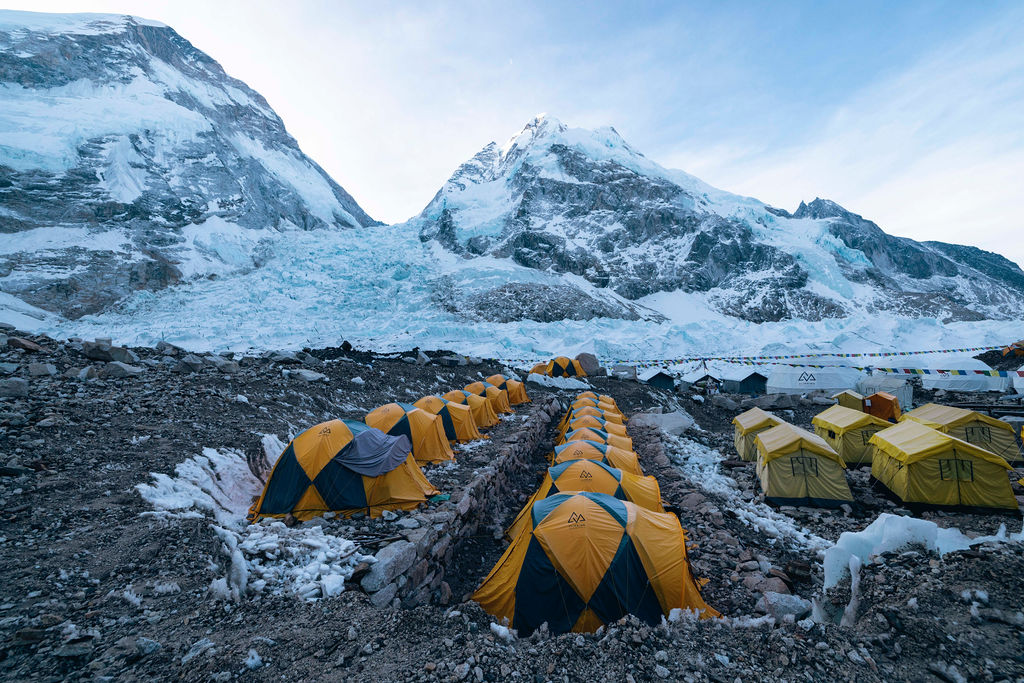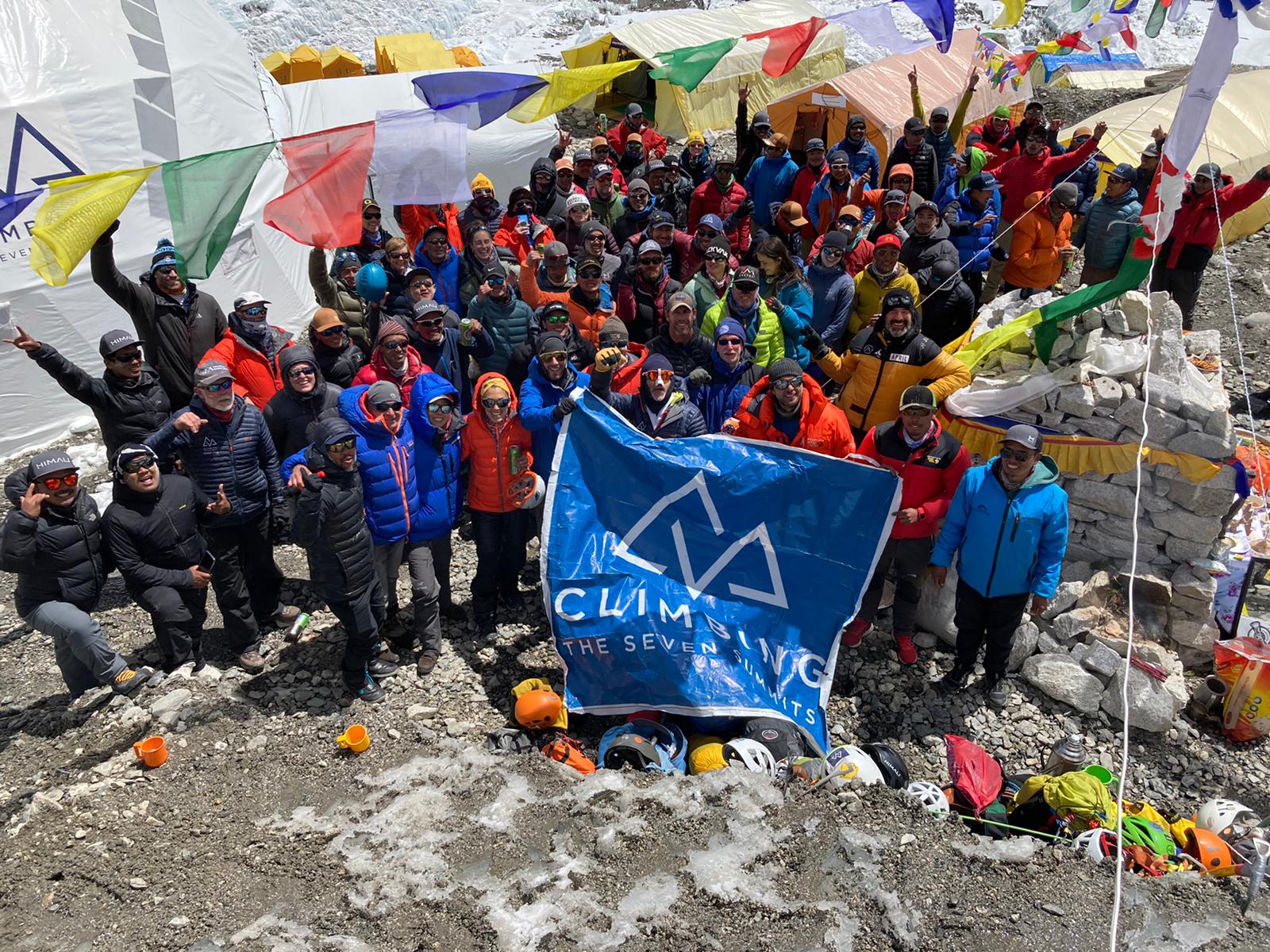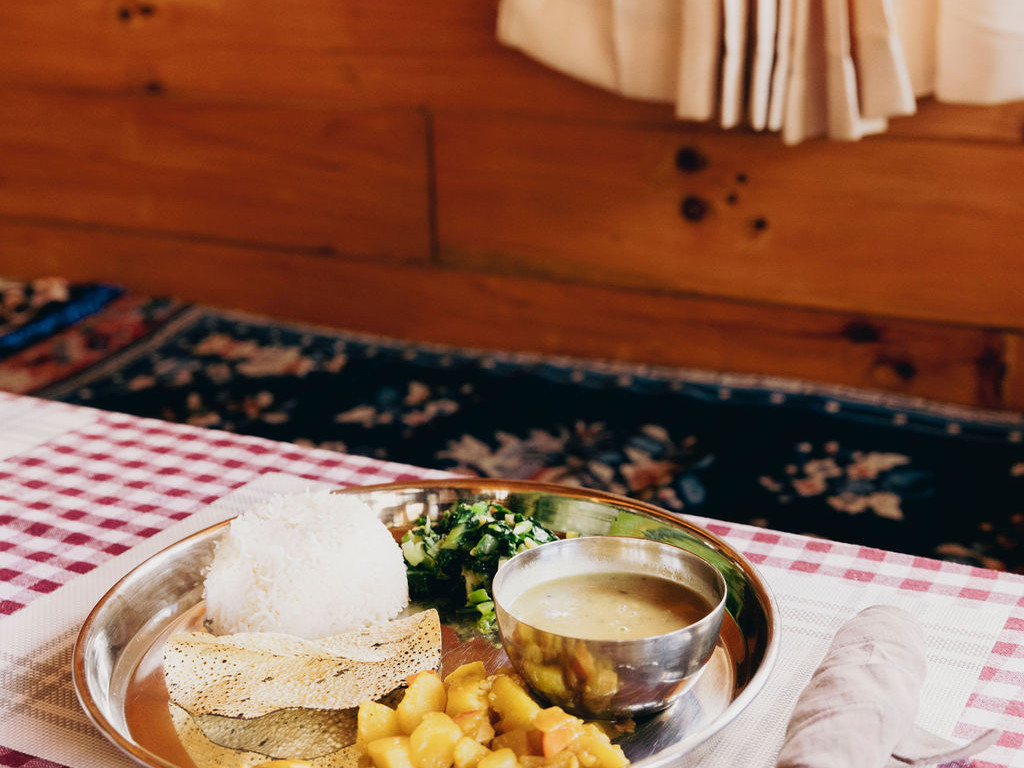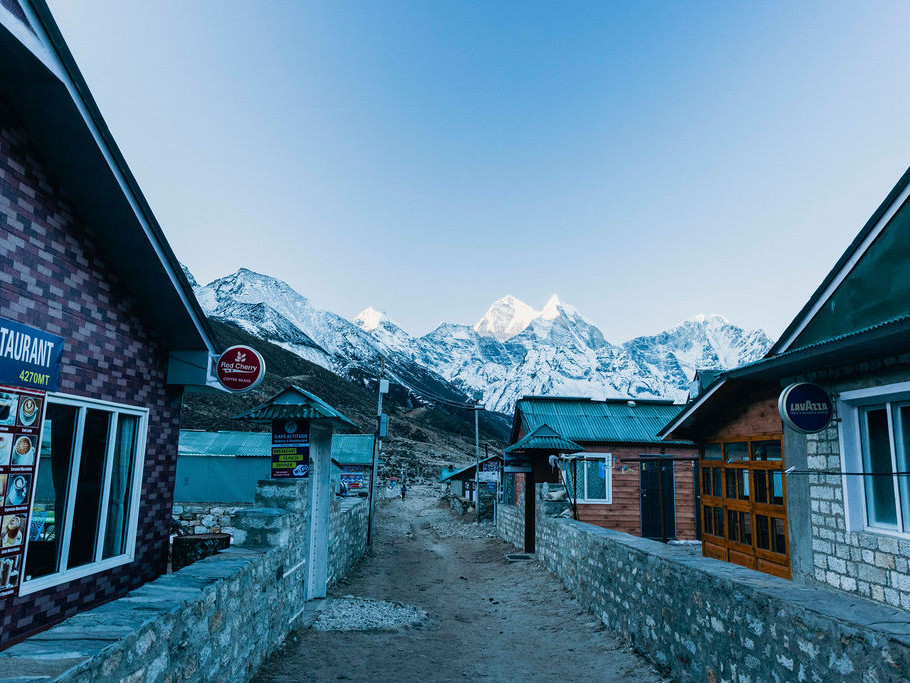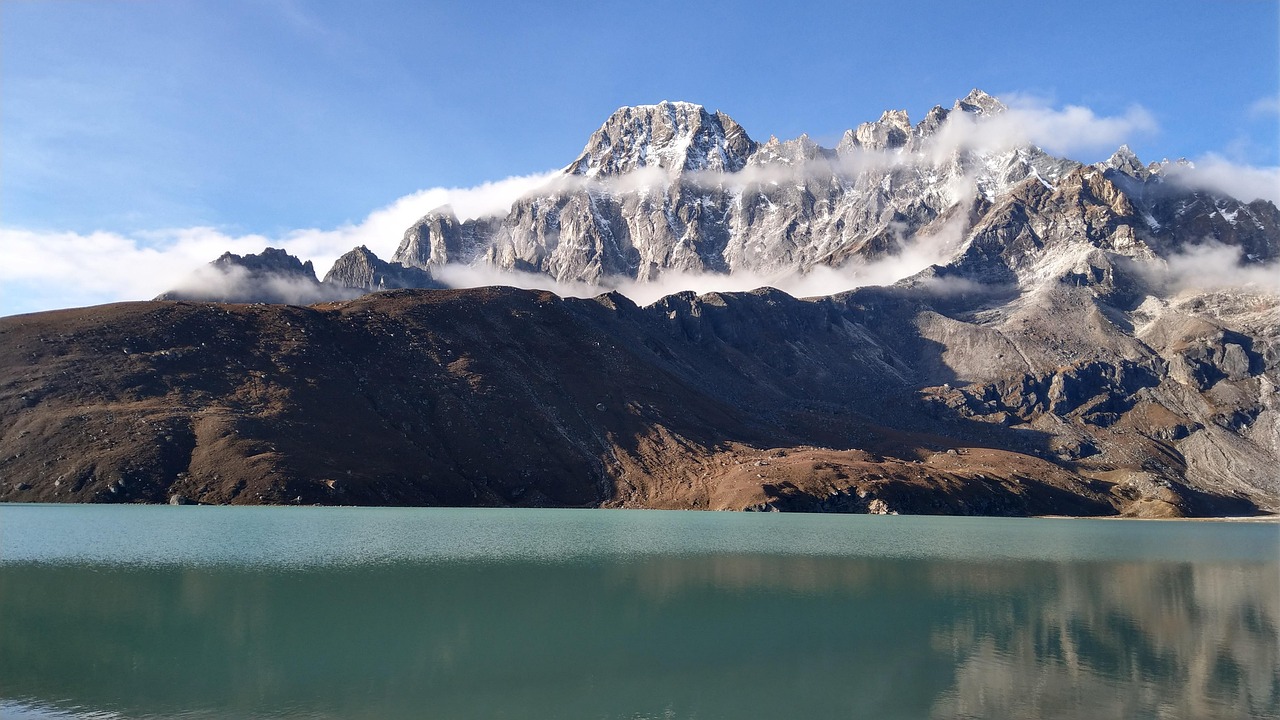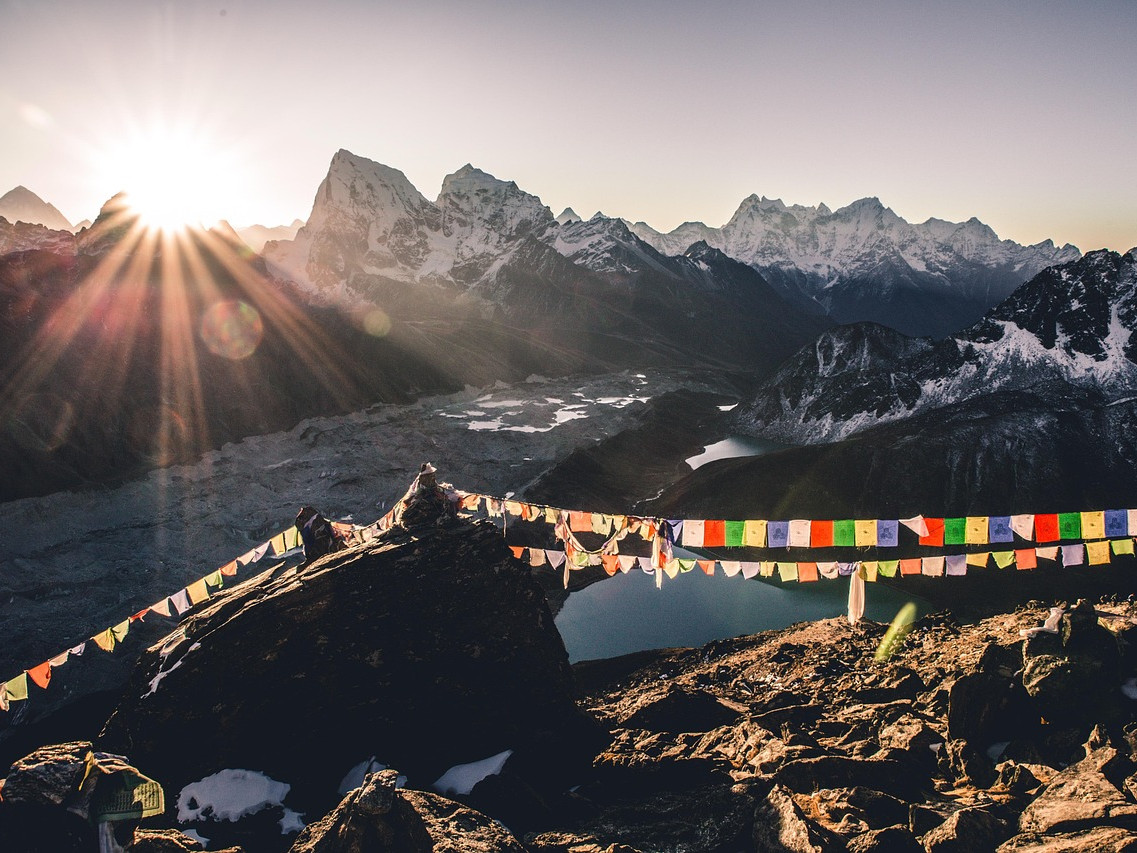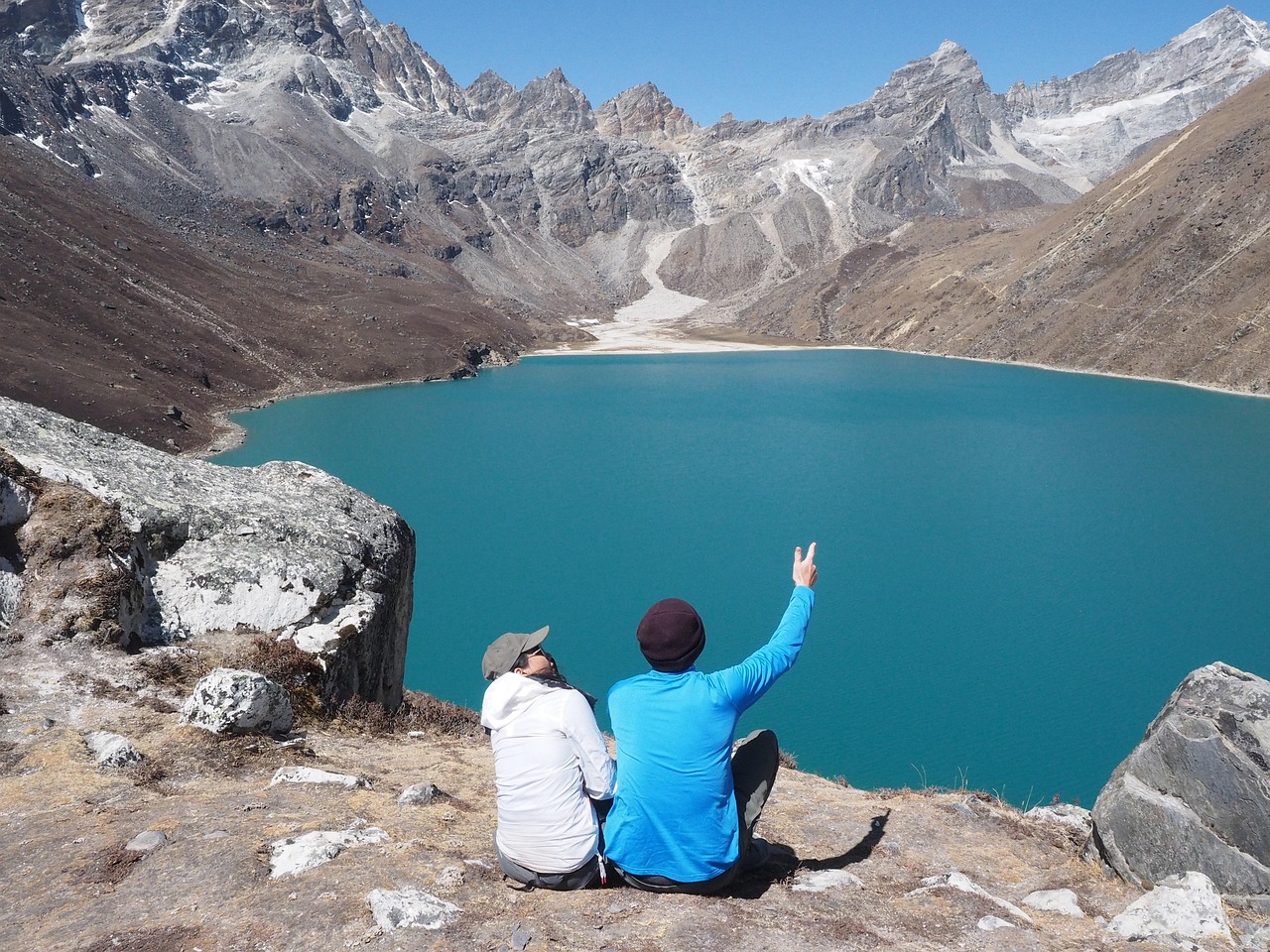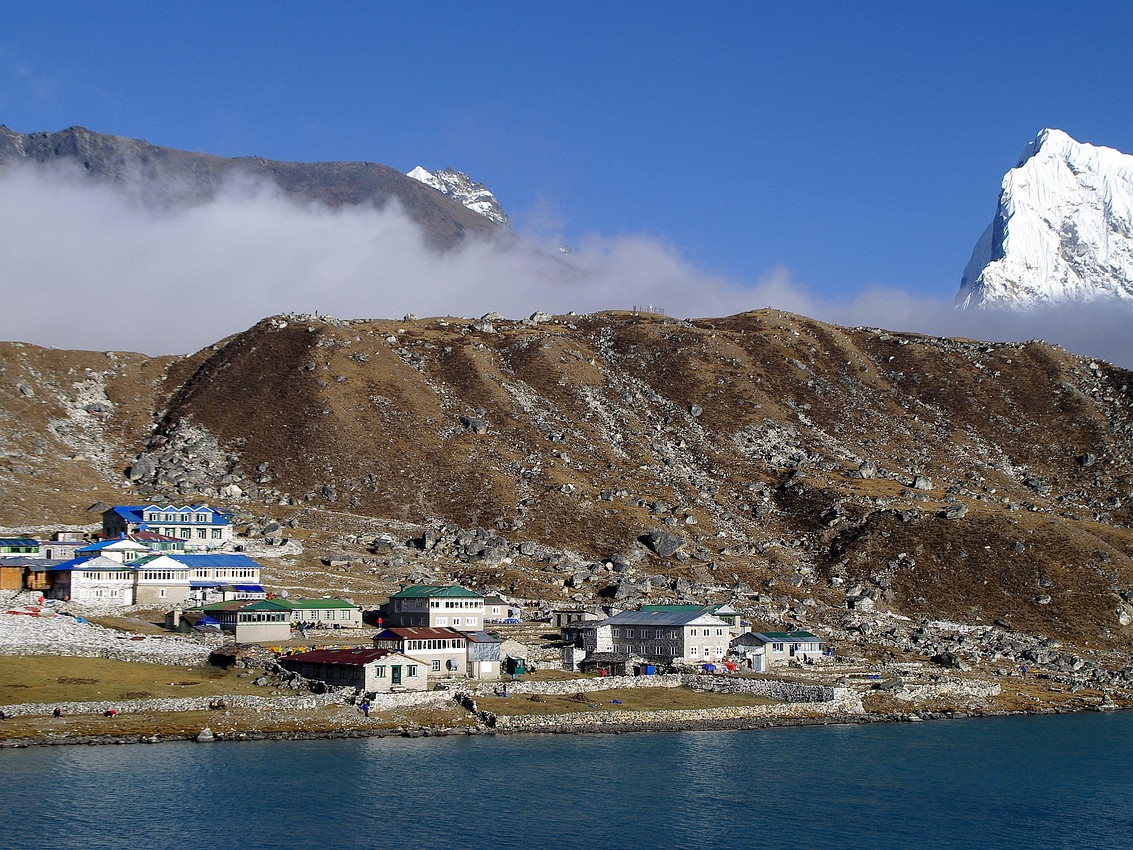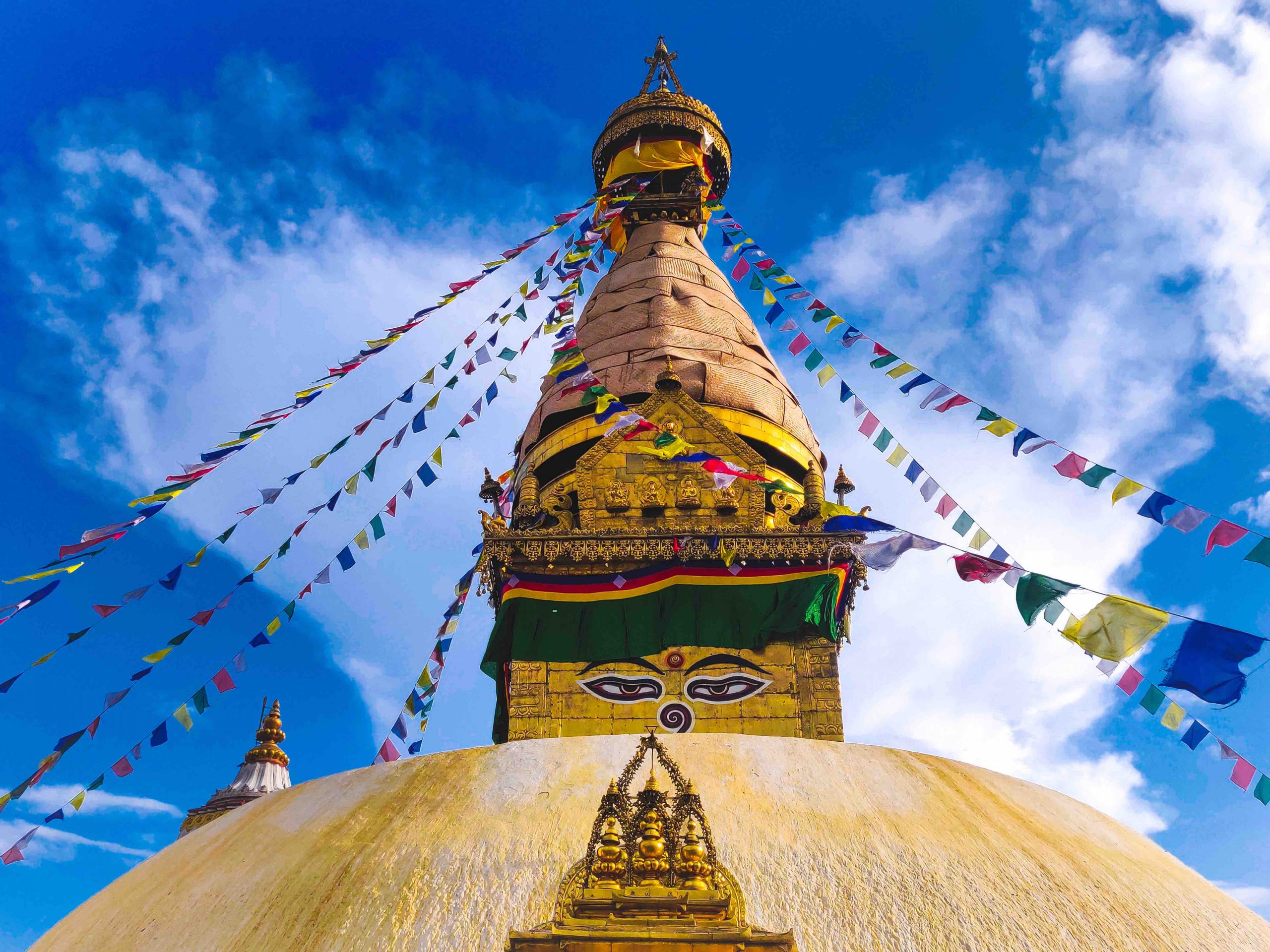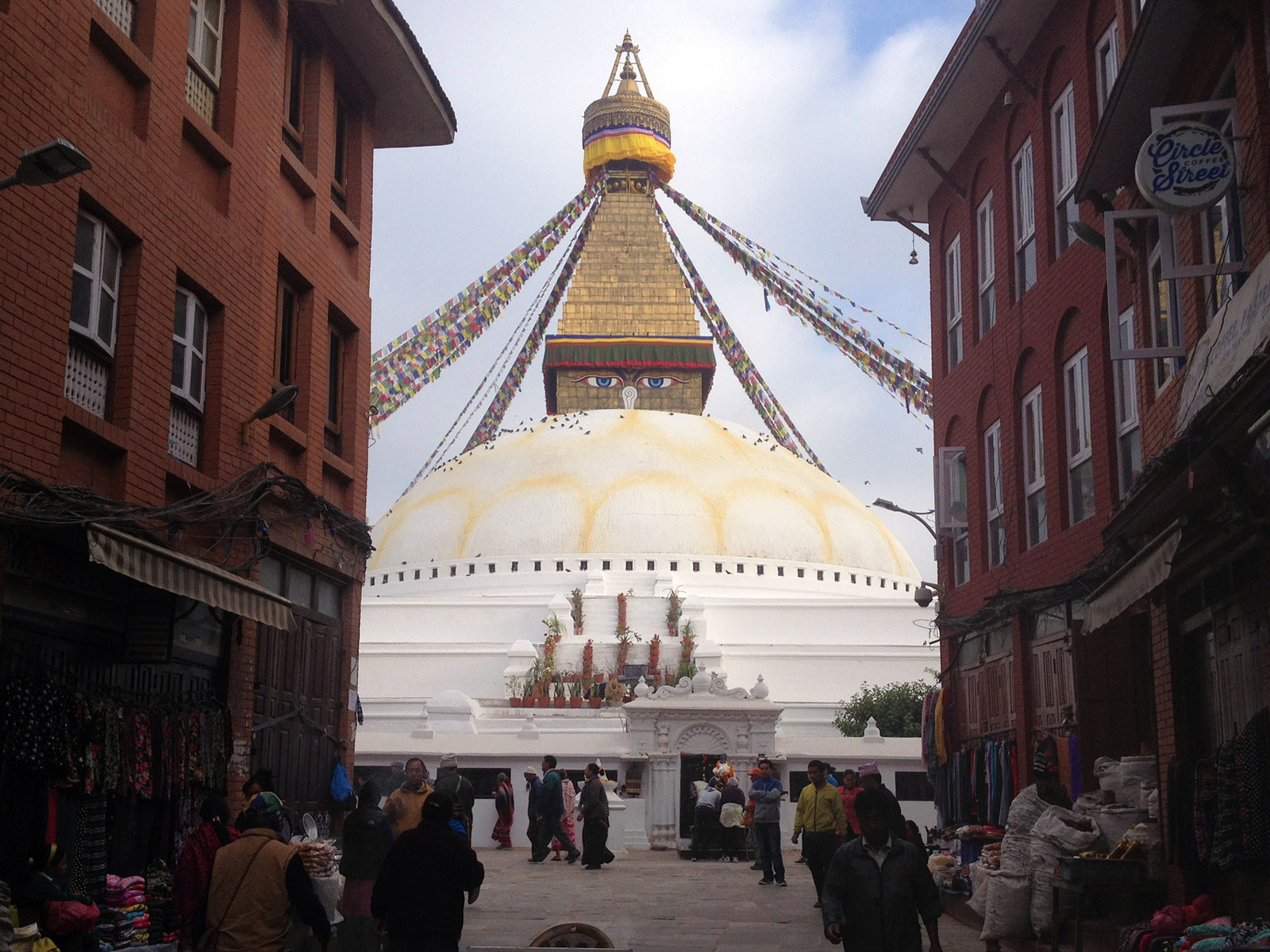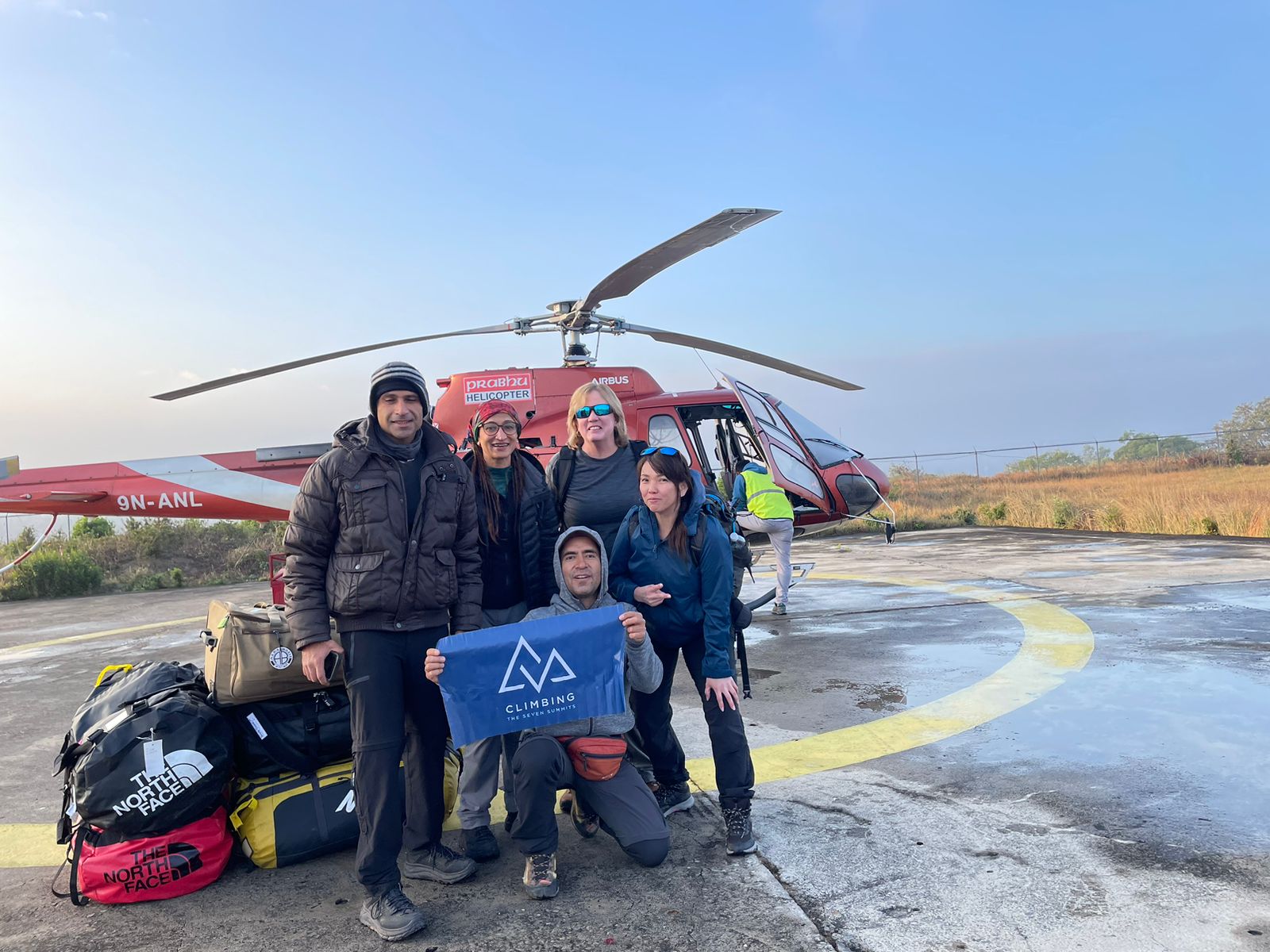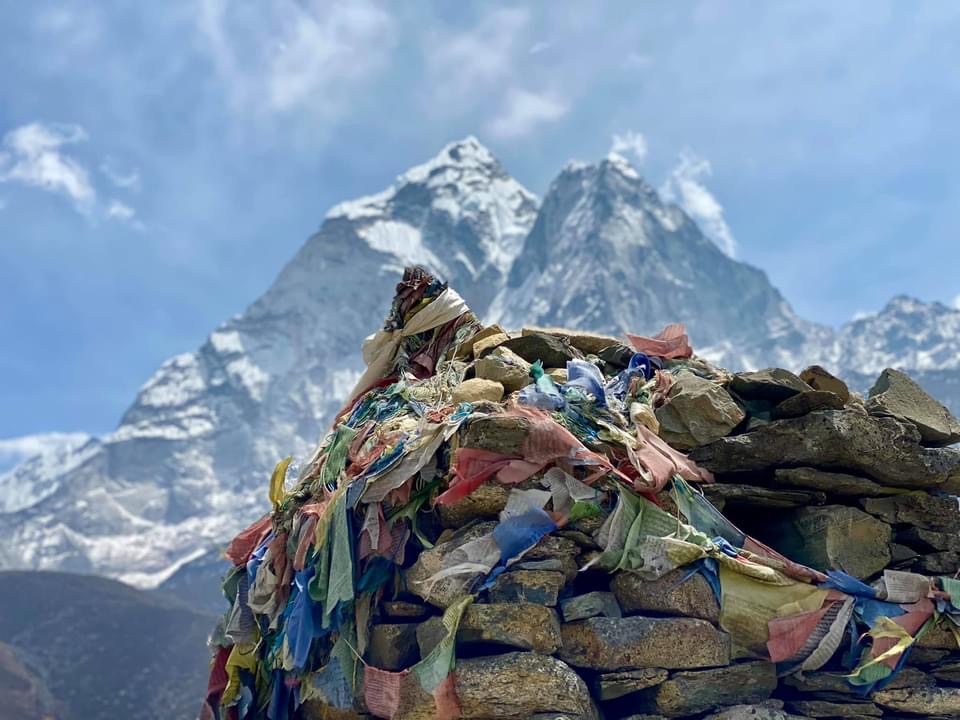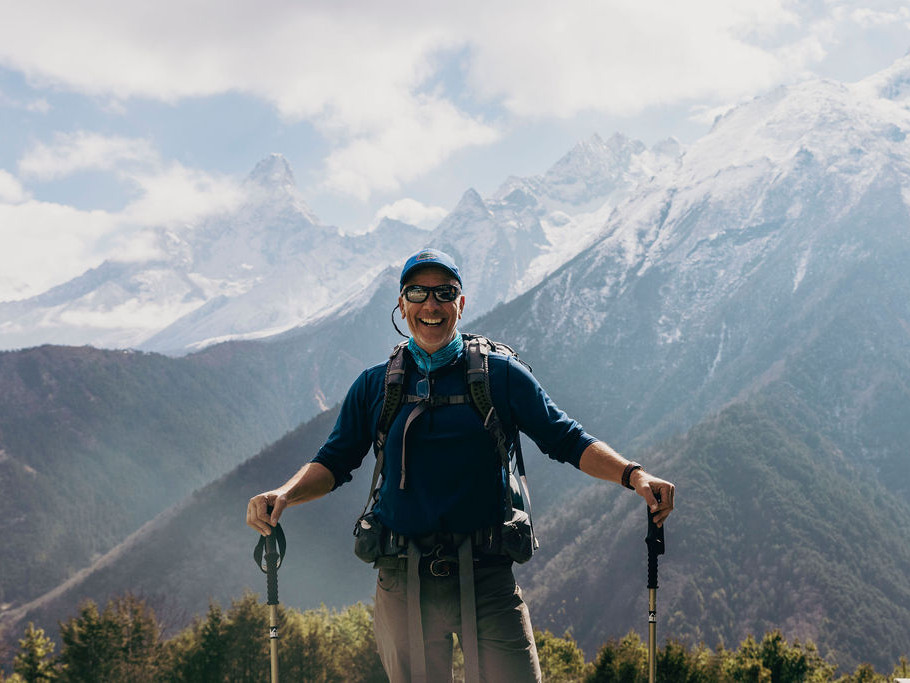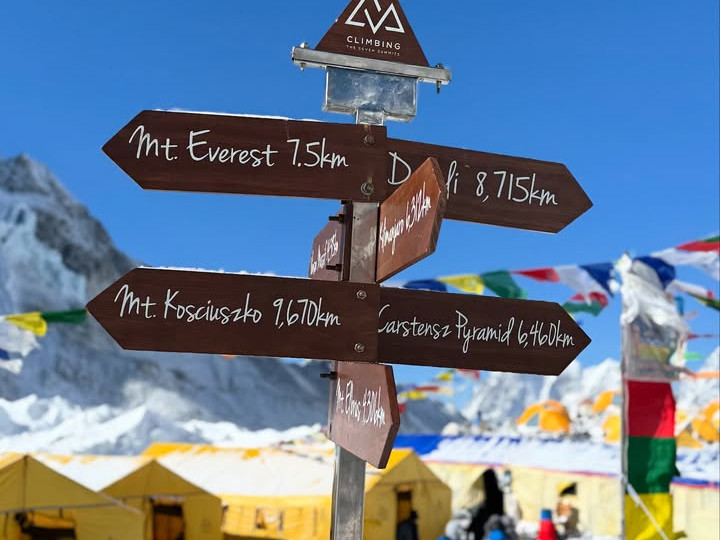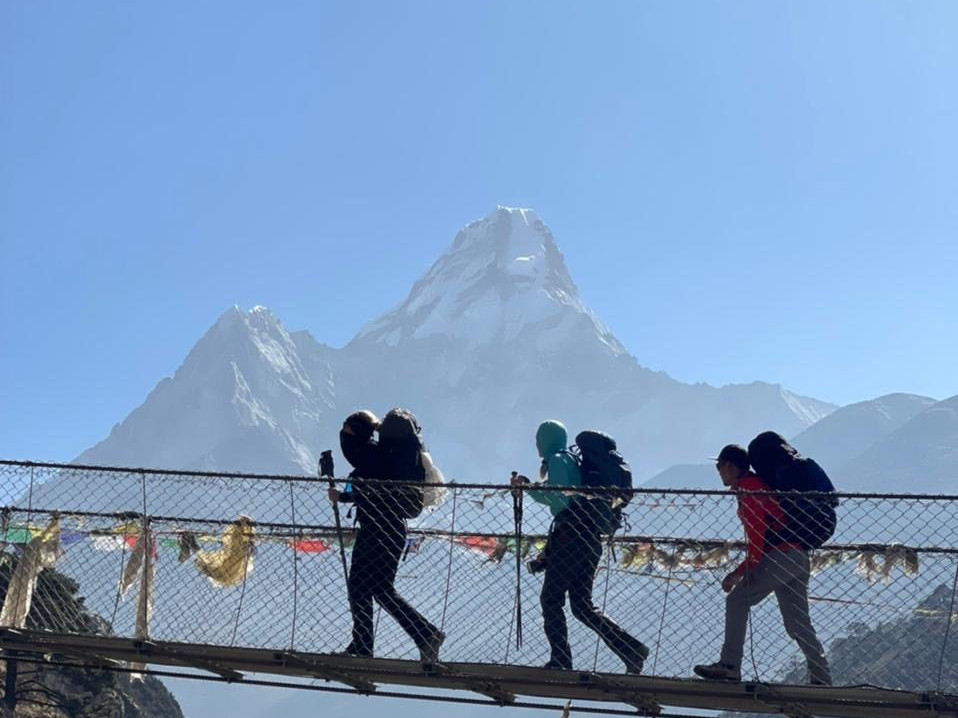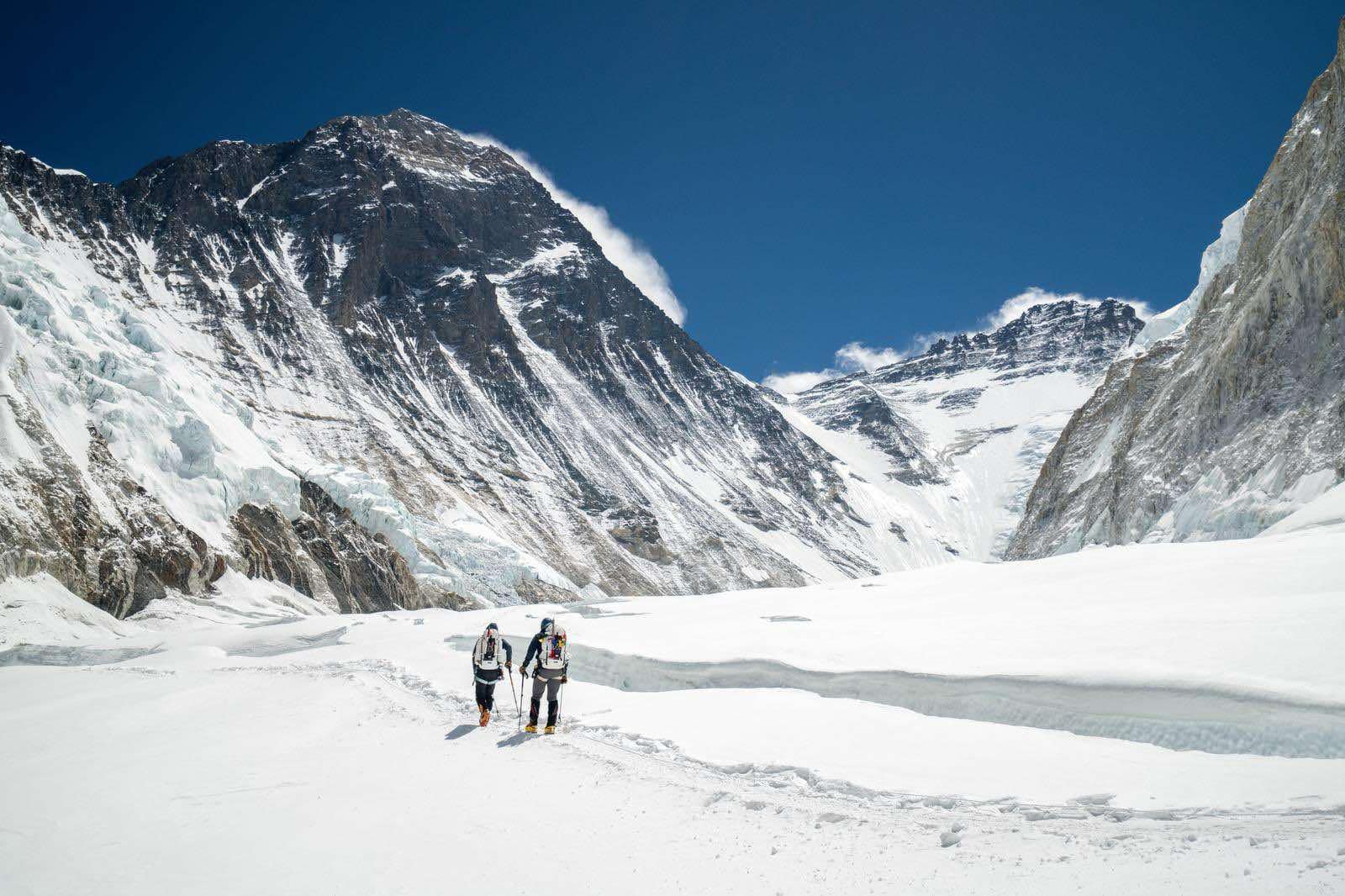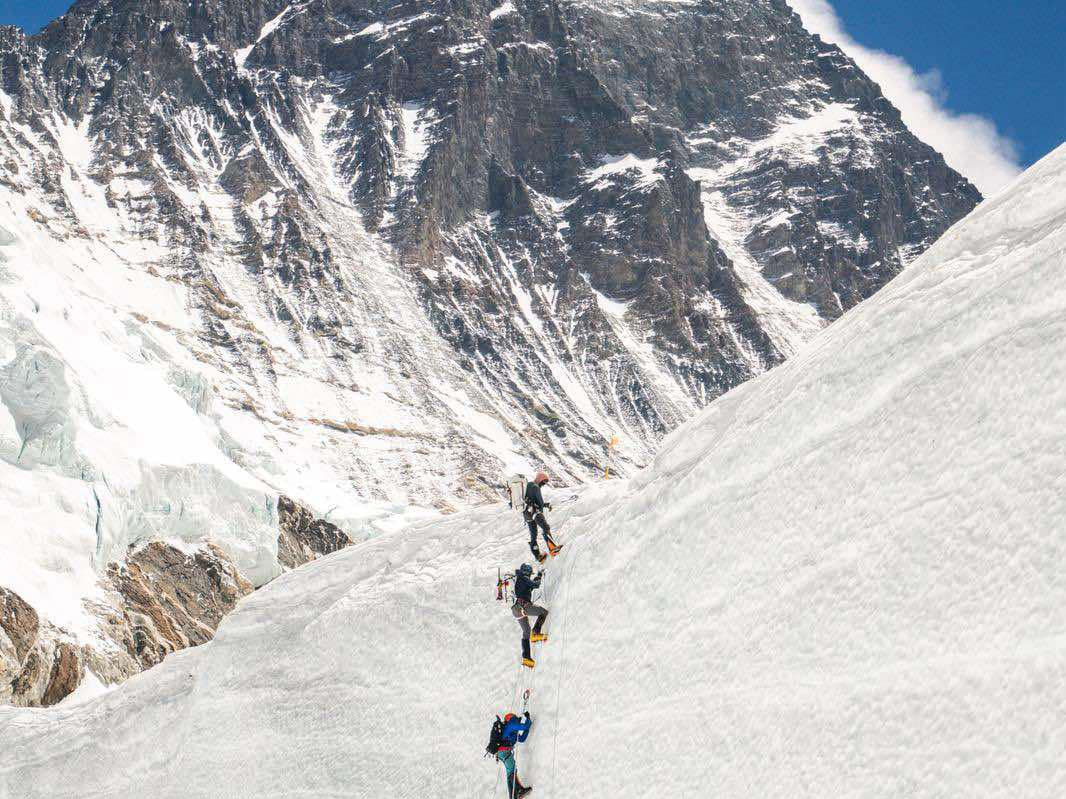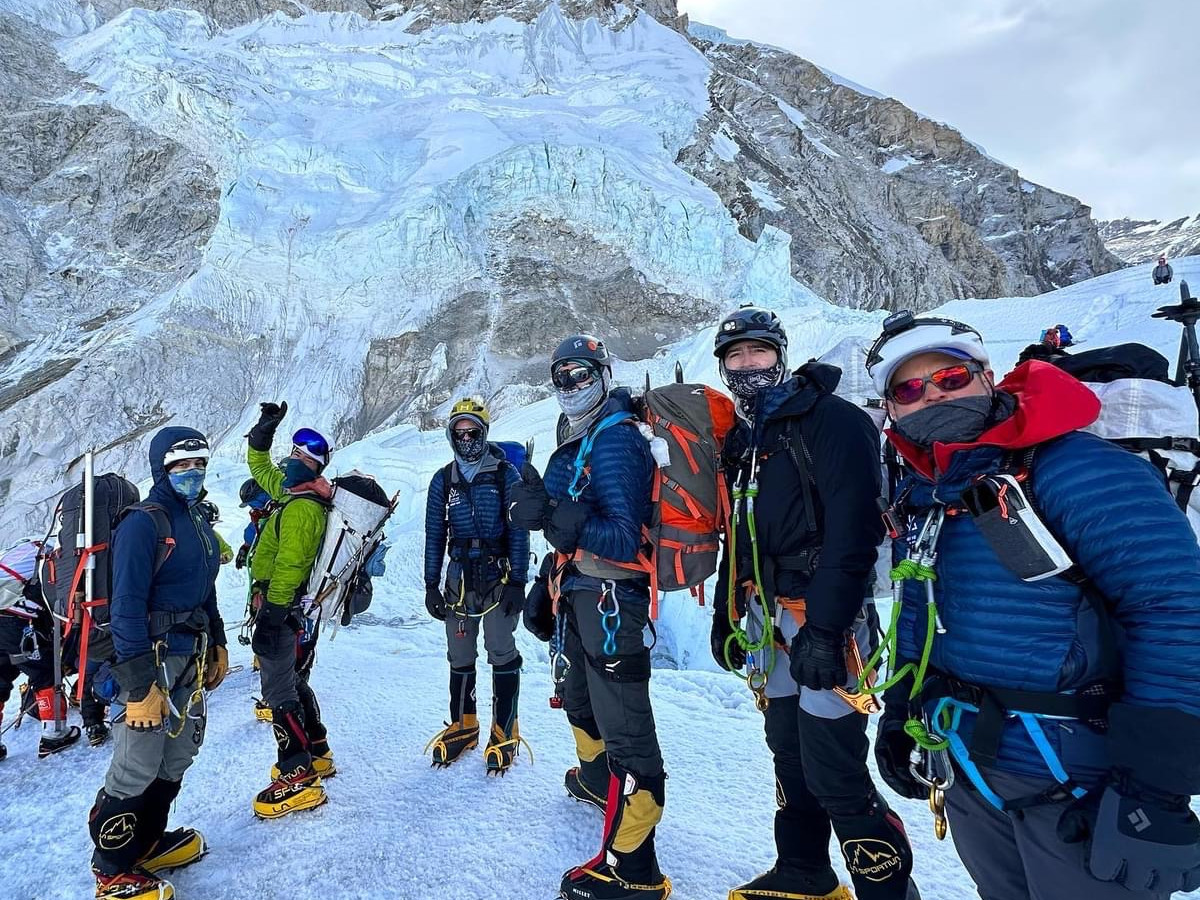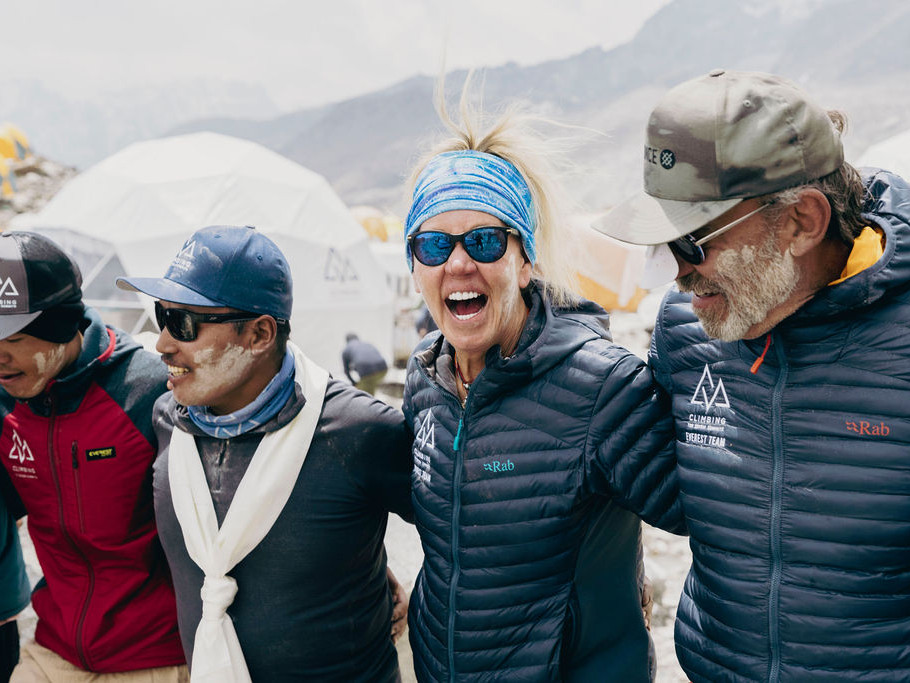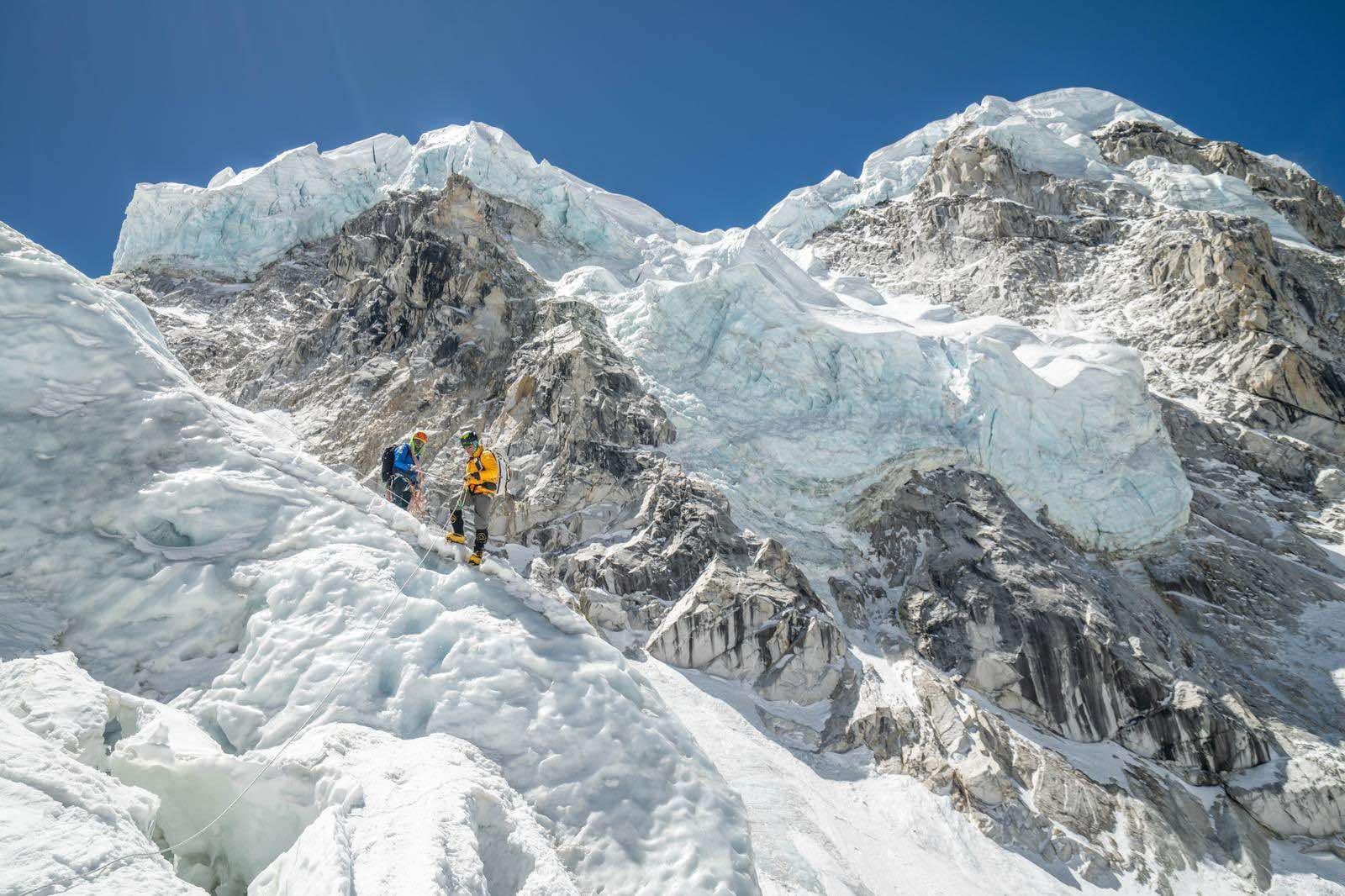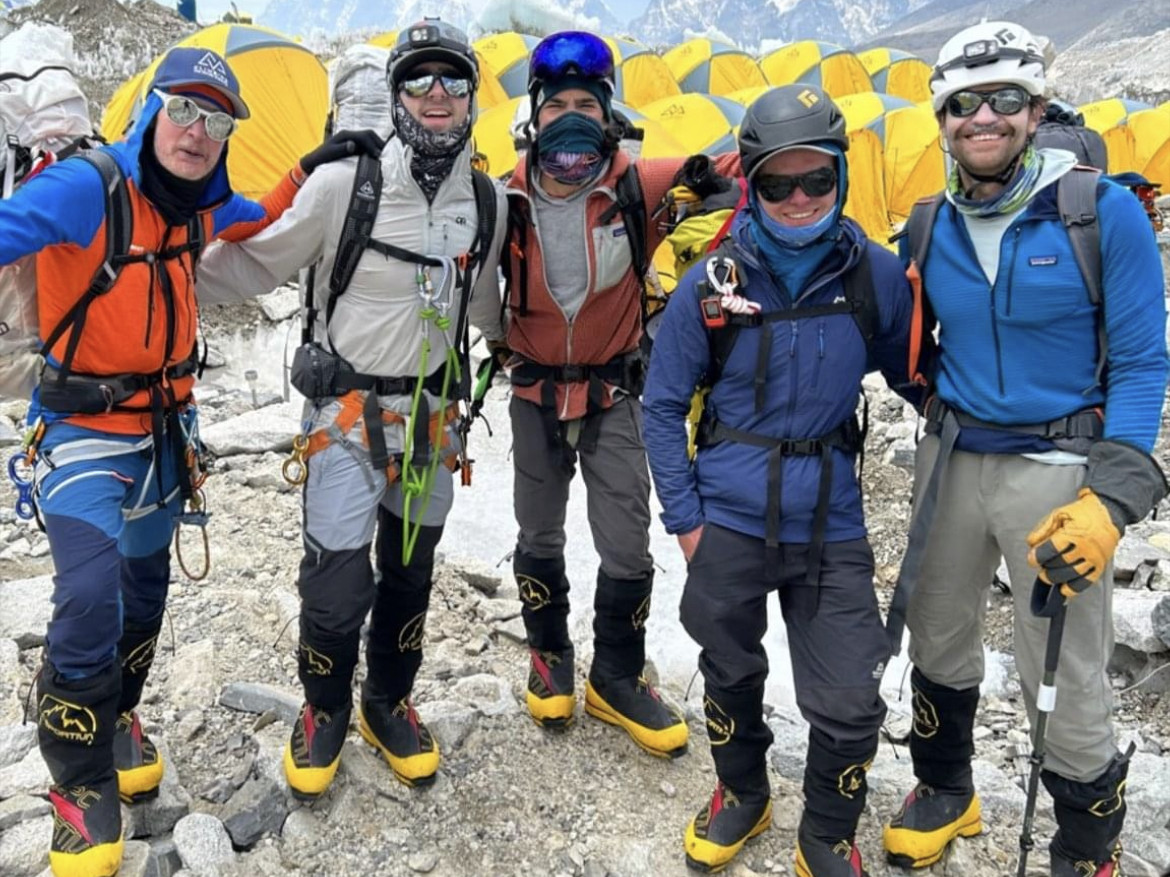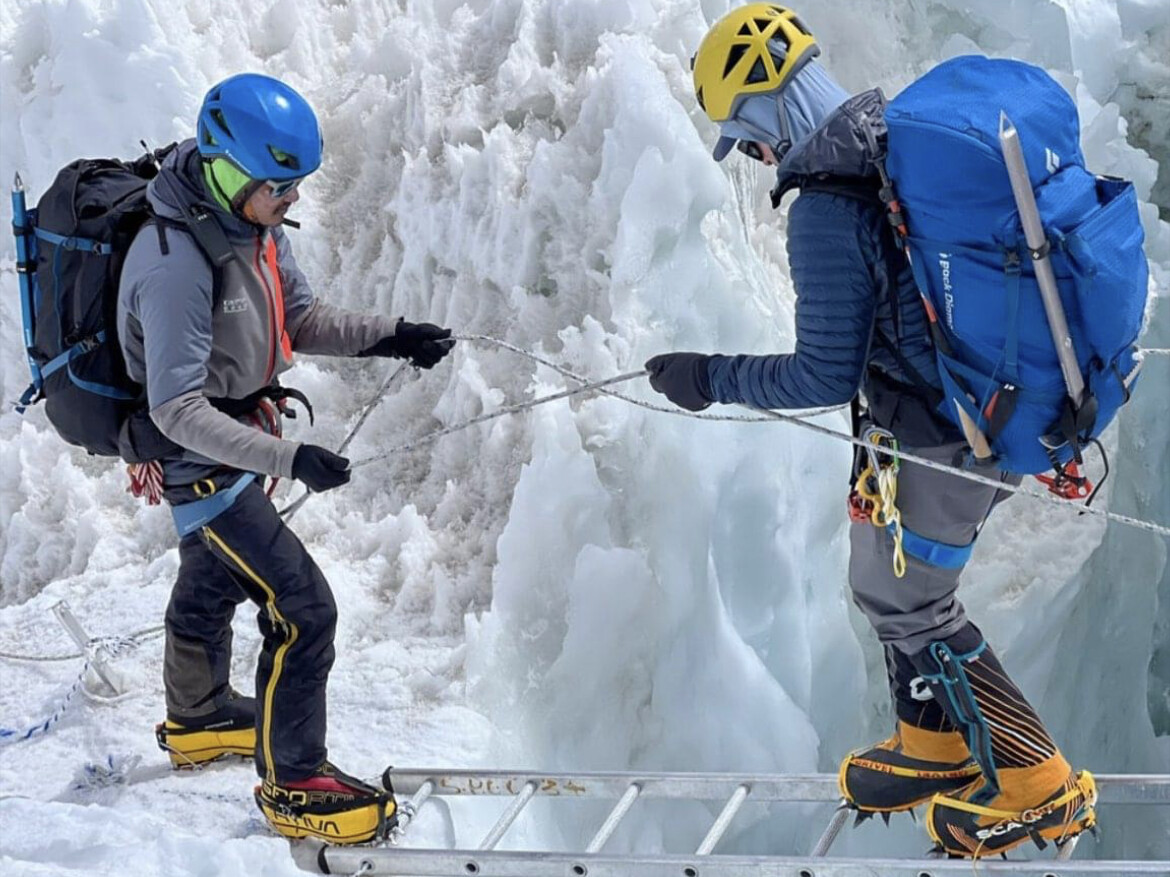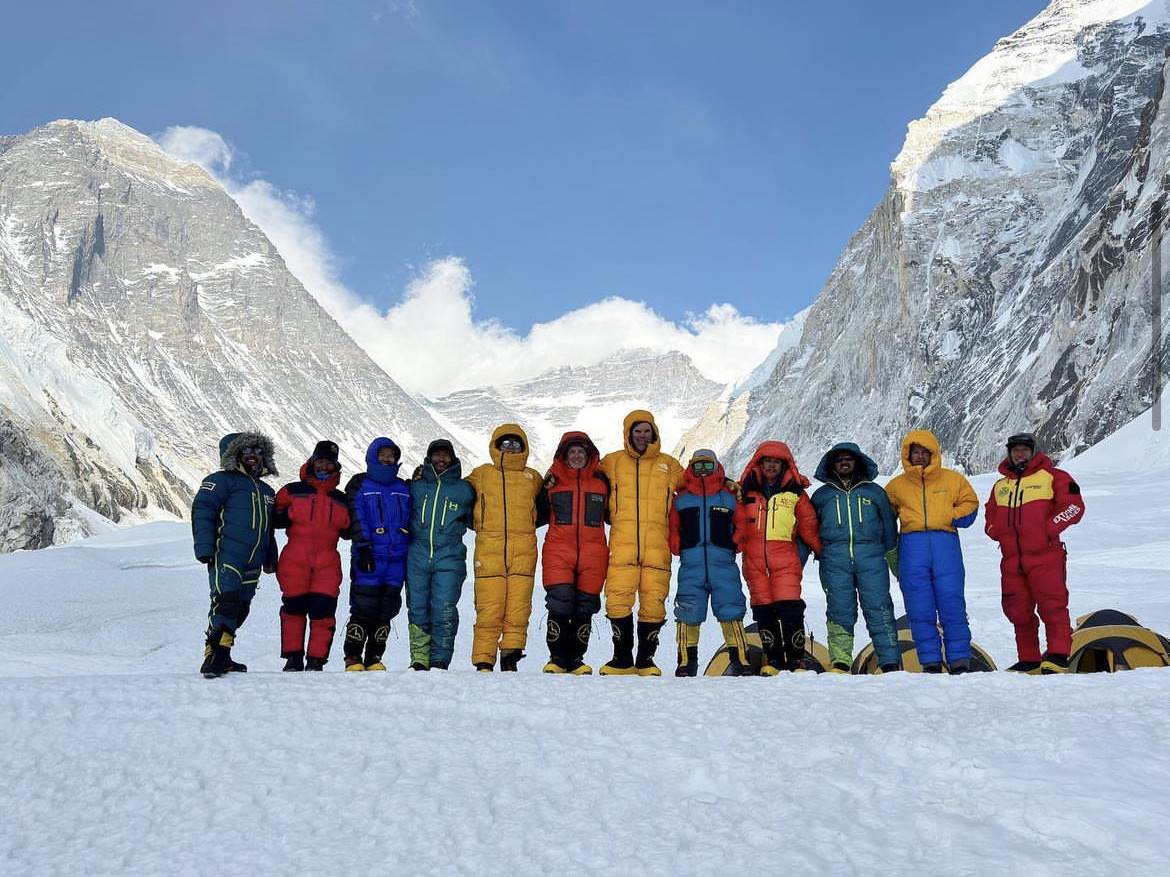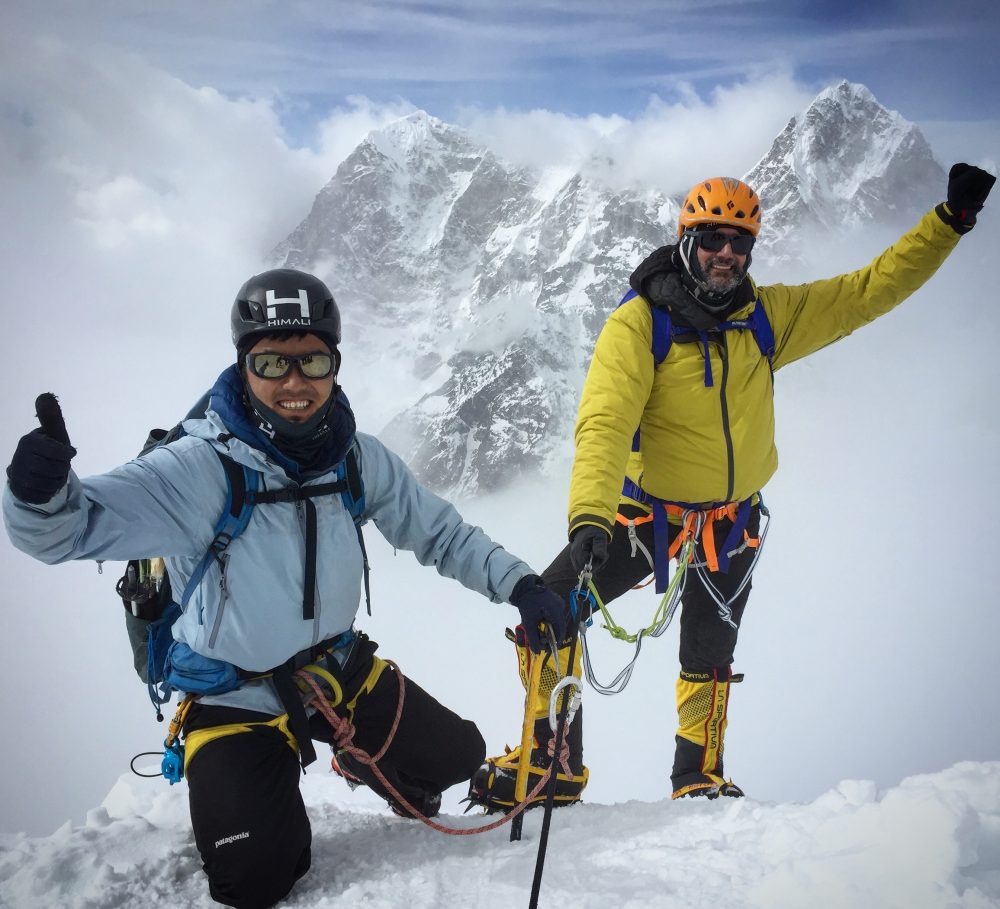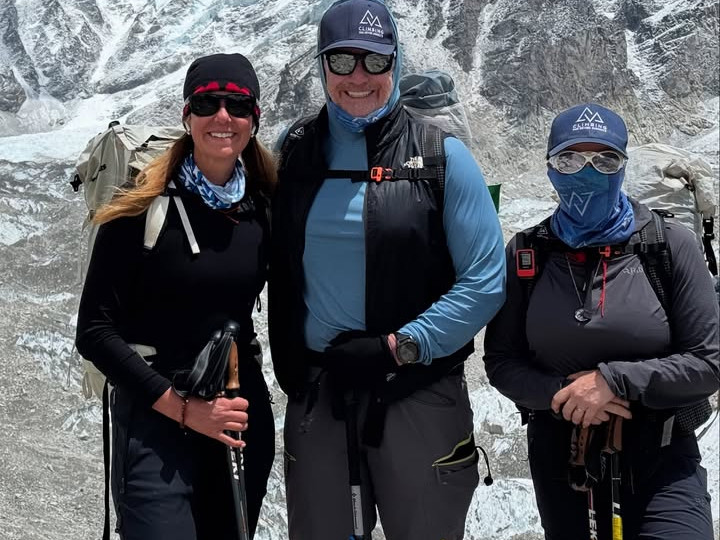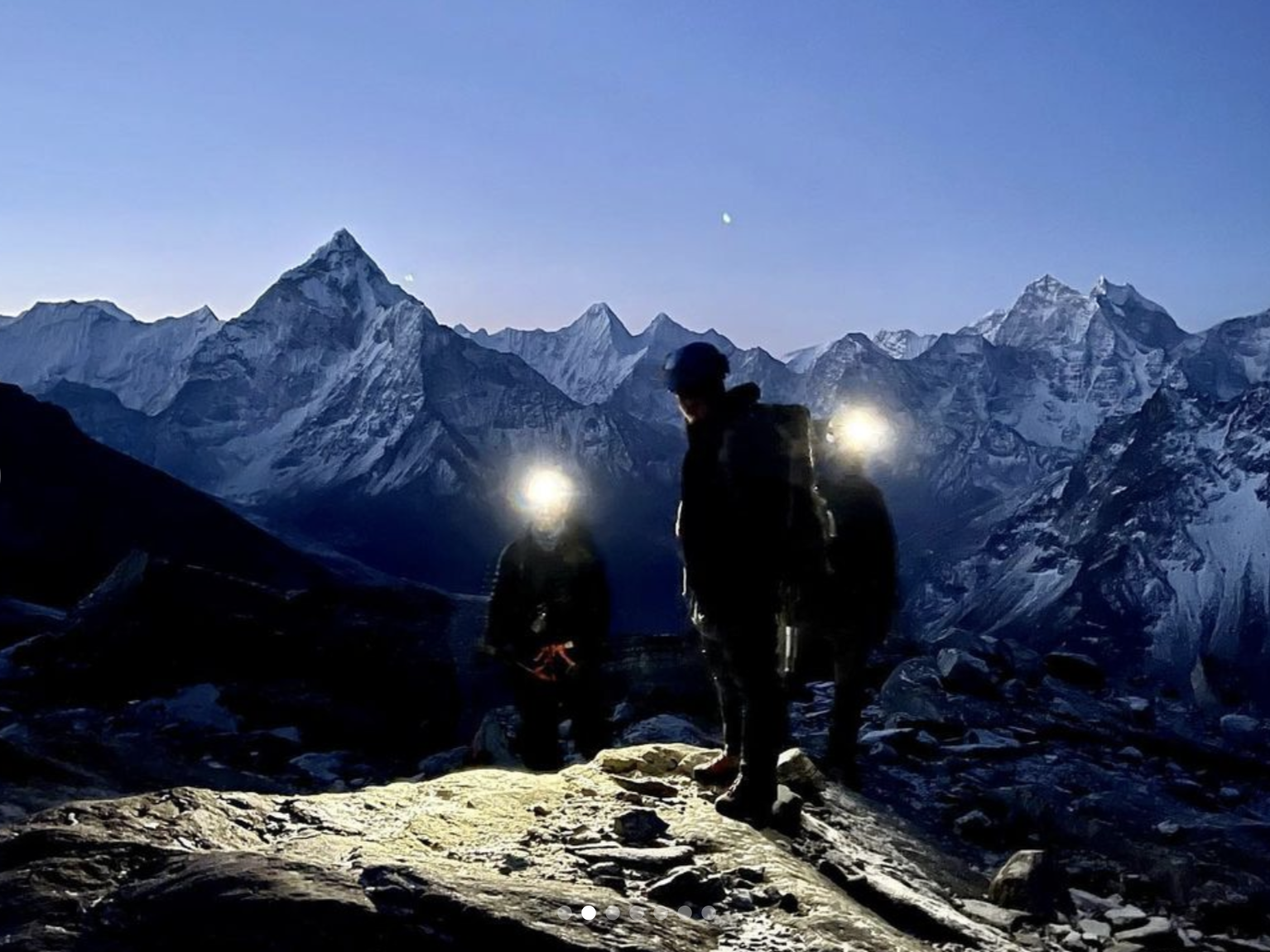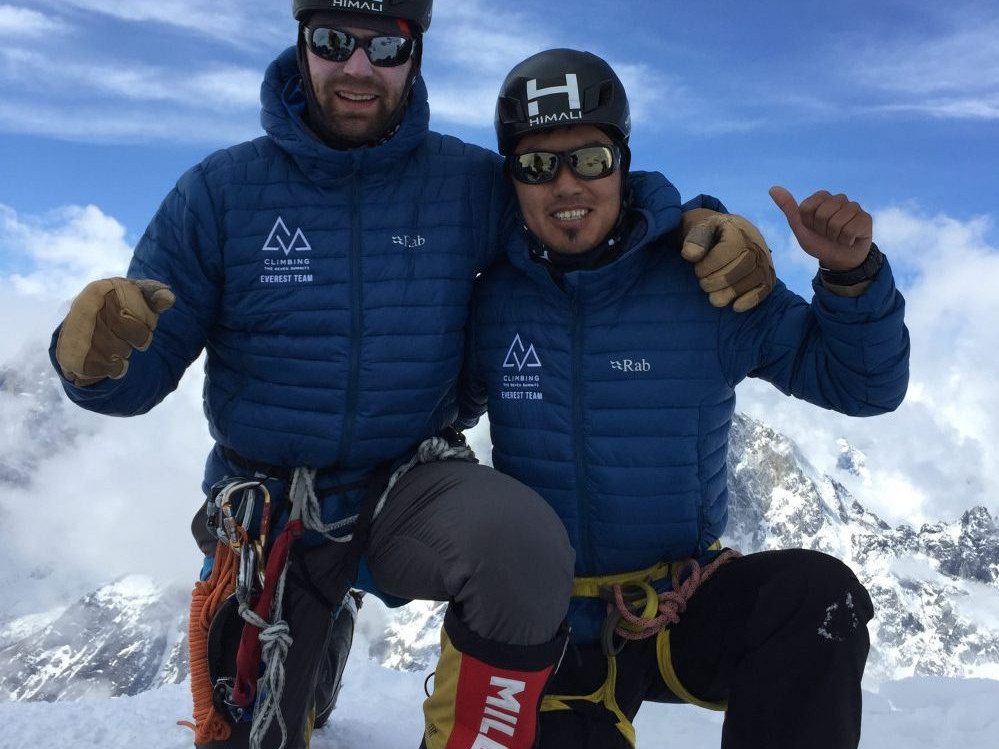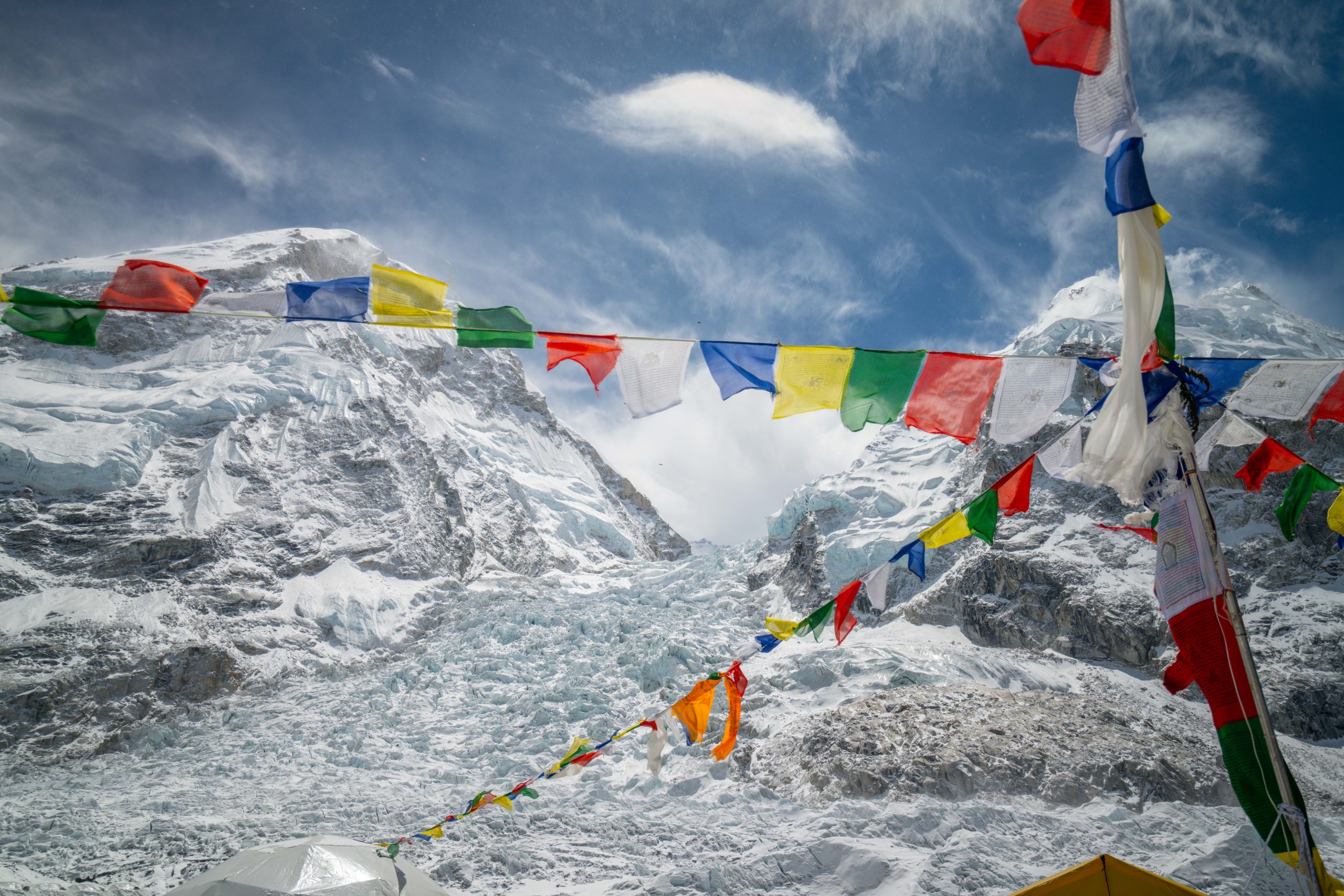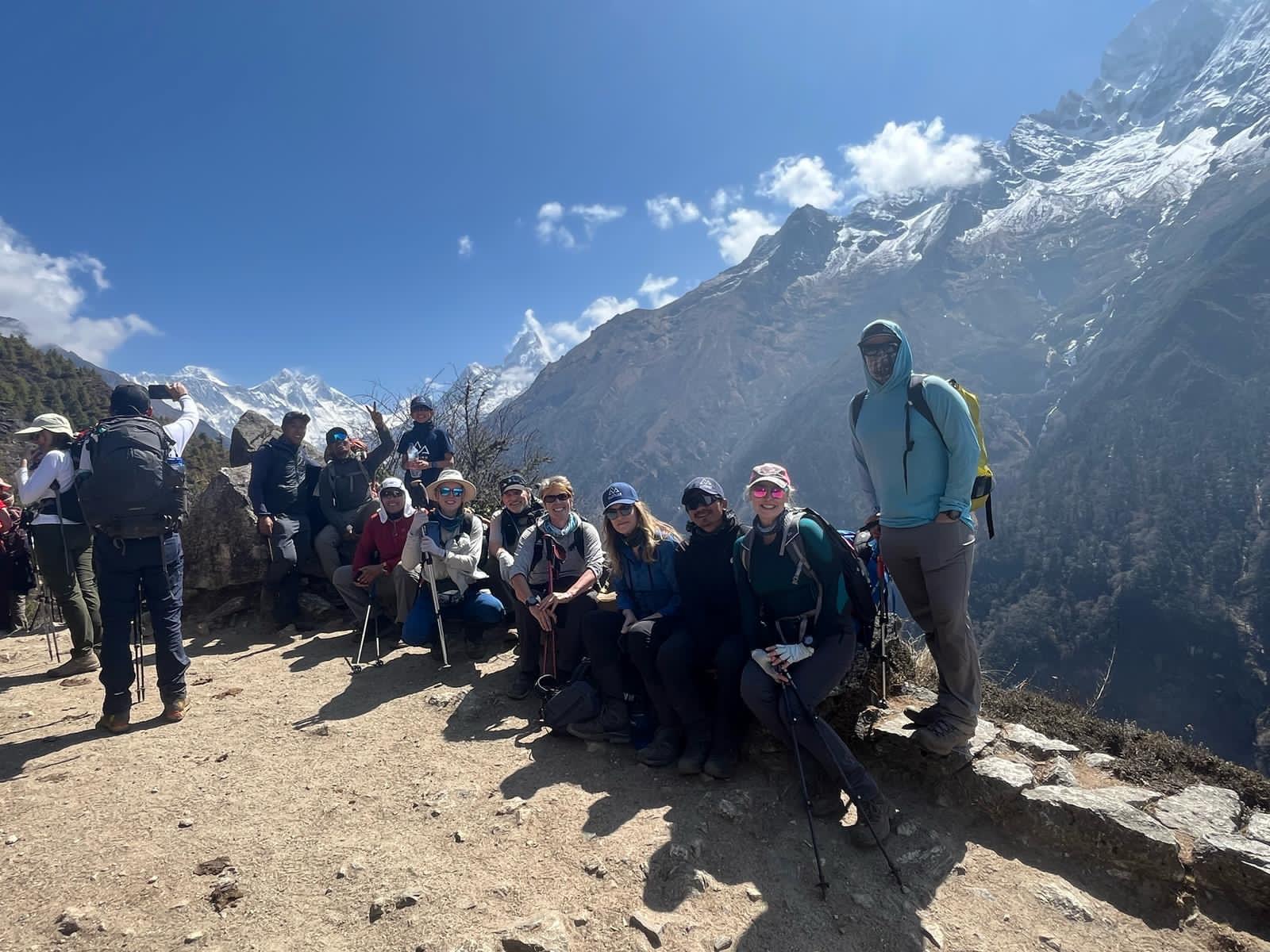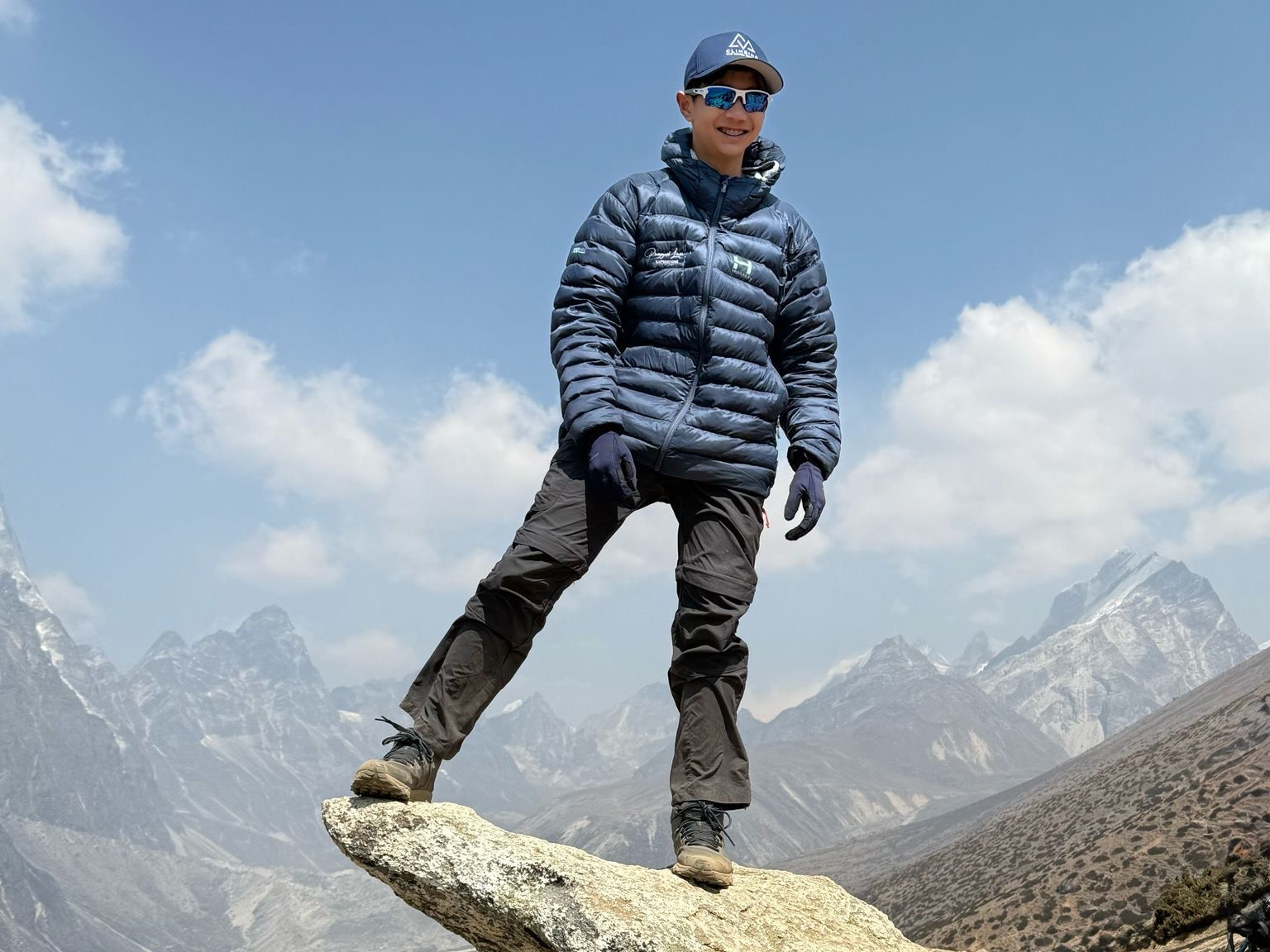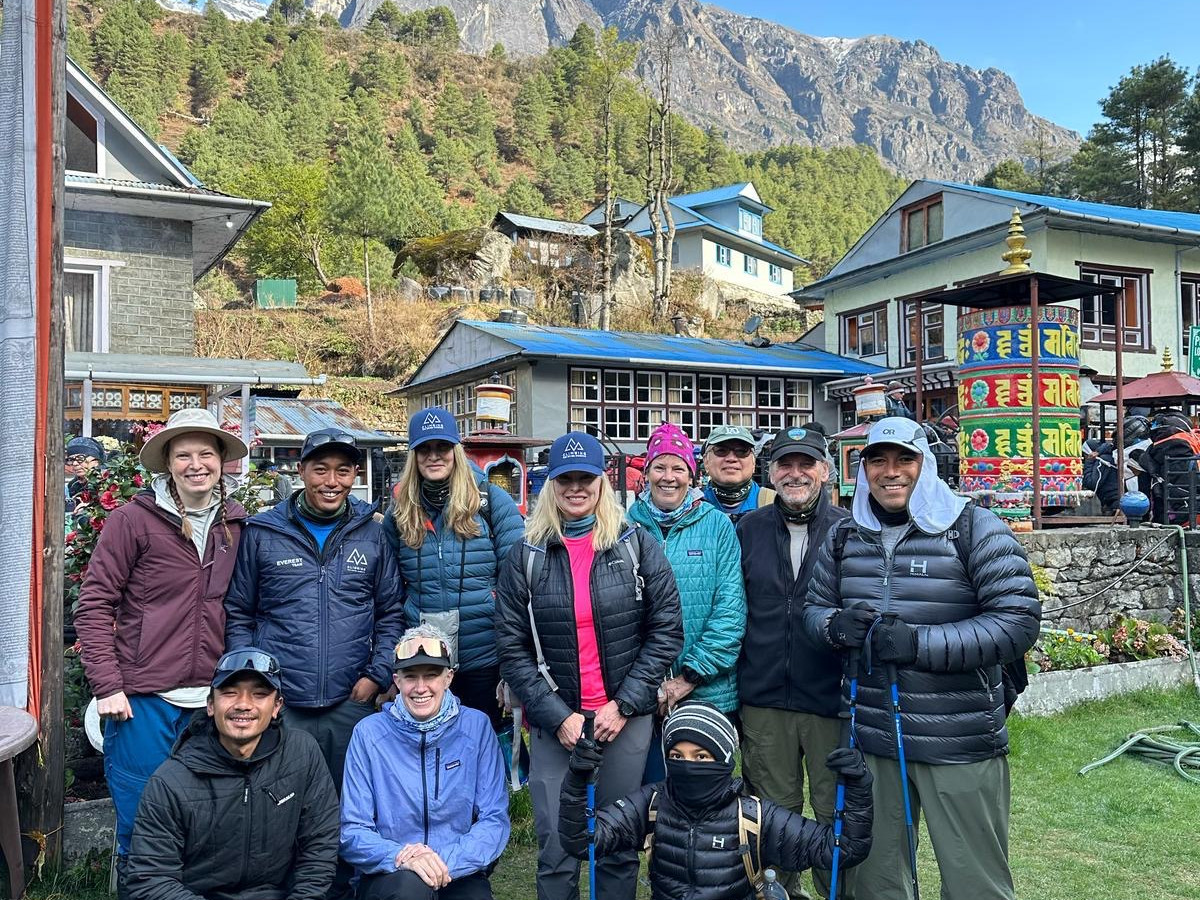Additional Nights at Everest Base Camp
Additional Nights at Everest Base Camp
$350 USD per night
If trekkers want to stay at Everest Base Camp beyond the itinerary, we can add nights for $350 USD per night. If you plan to stay longer than a week, you will need a Nuptse climbing permit, which allows you to stay at base camp throughout the Everest expedition season. Please contact us directly to arrange this.
Single Rooming
Everest Base Camp Trek: Single Rooming
$1,000 USD
We are happy to organize single-room accommodations throughout the expedition for you. If you aren’t price-sensitive, you snore, or you are easily awakened by others who do, this might be a great option.
We stay at some of the nicest teahouses in the Khumbu Valley throughout our trek to keep you healthy and comfortable. Many teahouses offer room upgrades that may include an en suite bathroom with a hot shower and additional space, whereas our standard rooms generally have a shared bathroom and shower for an additional fee.
EBC Trek + Gokyo Lakes Trek
Everest Base Camp Trek + Gokyo Lakes Return
$6,990 USD
- Annually: April 3rd – April 26nd
Once you’ve achieved your goal of Everest Base Camp, why not make your return a little different? Rather than retracing your footprints back down the Khumbu valley, instead spend a few days seeking some new scenery by visiting the Gokyo region. Gokyo itself is a small hamlet of stone houses and one of the highest settlements in the world, surrounded by truly breathtaking vistas, mountains, and glaciers.
You’ll see and experience more of these amazing, mighty Himalayan mountains, climb the famous Cho La Pass (5,420m) escape the madding crowd,s and view the stunning Gokyo Lakes before rejoining the main trail at Namche Bazaar for the final day’s trek back to Lukla.
This extension is best suited to experienced and fit trekkers who are keen to get off the beaten path and further challenge themselves
Everest Base Camp Trek + Gokyo Return Itinerary
This itinerary is a rough estimate and will be adjusted according to weather and conditions. This is adventure travel, meaning things rarely go as planned, and this schedule will likely change. Climbers need to be adaptable and maintain a positive attitude.
We always recommend climbers arrive in Kathmandu one day early to avoid travel delays or issues with lost baggage. The client is responsible for the added expenses (hotel/food/sightseeing) of this extra day. Please let us know if we need to organize logistics for your early arrival or accommodation upgrades.
- Day 1: Team Arrives. Pick up from airport and transfer to hotel.
- Day 2: Gear Checks/Guide Briefing. Free afternoon in KTM
- Day 3: Fly to Lukla/Phakding
- Day 4: Trek to Namche
- Day 5: Rest/Acclimatize hike Namche
- Day 6: Trek to Tengboche
- Day 7: Rest/Acclimatize hike Tengboche. Visit Tengboche Monastery
- Day 8: Trek to Pheriche
- Day 9: Rest/Acclimatize hike Pheriche. Visit HRA
- Day 10: Trek to Lobuche Base Camp
- Day 11: Acclimatization Climb Lobuche High Camp, return to Base Camp
- Day 12: Trek to Gorak Shep
- Day 13: Climb Kalapattar - Trek to Everest Base Camp
- Day 14: Everest Base Camp Day (Climbing Clinic)
- Day 15: Everest Base Camp to Dzongla
- Day 16: Dzongla to Dragnag via Cho La Pass
- Day 17: Dragnag to Gokyo via the Ngozumpa Glacier
- Day 18: Explore the Gokyo Region with options to climb Gokyo Ri or trek further up valley to Gokyo Lakes Lakes and climb Gokyo Peak
- Day 19: Trek to Machermo
- Day 20: Trek to Namche Bazaar
- Day 21: Trek to Lukla
- Day 22: Fly Lukla to Kathmandu
- Day 23: Contingency Day
- Day 24: Fly home
Our expeditions are designed to be fully inclusive, except for certain services and personal items, such as flights, gear, and insurance.
We highly recommend adding contingency days to the end of your trip and booking a flexible fare for the return flight. Flights can sometimes be delayed out of the Khumbu due to mountain weather. Please note CTSS covers one night in Kathmandu at the end of your trip.
Included in the Everest Base Camp Trek + Gokyo Return:
- Professional trek leaders
- Leadership, strategy, logistics, and expedition oversight
- Airport transfers
- Accommodation in Kathmandu (double-occupancy)
- Welcome dinner
- Transportation associated with the program itinerary
- Flights to and from Lukla
- Accommodation in lodges and teahouses in the Khumbu Valley (double-occupancy)
- 2x nights accommodation at Everest Base Camp Proper (double-occupancy)
- Tent accommodation at Lobuche Base Camp
- Breakfast and dinner during the expedition
- Park fees and trekking permits
- Porters to carry trekking duffels on the trek
- Mountain camp infrastructure and logistics
- Group gear that is not included in the expedition gear list
Excluded from the Everest Base Camp Trek + Gokyo Return:
- International Flight to/from Kathmandu, Nepal
- Airport arrival or departure taxes
- Associated travel expenses (visas, passports, reciprocity fees, vaccination charges, excess baggage)
- Optional add-ons, excursions, or additional days before or after the scheduled program
- All costs incurred prior to the start date of the trip and after the end date
- Single-room accommodations, if desired and pre-booked
- All in-town restaurant meals (non-team meals in Kathmandu are your own responsibility)
- Bar tabs, minibars, hotel internet bills, laundry, etc.
- Personal climbing gear, equipment, and snacks (see Gear List for details)
- Sherpa tip pool ($300 for trekkers)
- Guide tips (customary but optional)
- Required trip insurance policy (trip cancellation, interruption, rescue & evacuation, medical treatment, repatriation, etc.)
- Unused contingency days at the end of your program (CTSS covers one night in the hotel in Kathmandu on your return; additional nights are your responsibility)
- Costs incurred as a result of events beyond the control of CTSS
- Expenses while on the expedition that are above and beyond the normal scope of the trip
- Rescue expenses or excess expenses above and beyond our normal trip costs
Kathmandu Cultural City Tour
Everest Base Camp Trek: Kathmandu Cultural City Tour
$250 USD
Kathmandu is one of the most exciting, culturally rich cities in the world. Unique and overflowing with sights, smells, sounds, and tastes, it’s both chaotic and charming. A city of true contrast, it needs to be experienced to be understood. During our Kathmandu Cultural Tour, an English-speaking guide will lead you through the city’s best historical and UNESCO sites.
Helicopter Options
Everest Base Camp Trek & Stay: Helicopter Options
Round-Trip Helicopter from Kathmandu to Lukla
$1,500 USD
Due to ongoing flight restrictions at Tribhuvan International Airport (KTM), almost all flights from Kathmandu to Lukla now operate from Ramechhap, a smaller airstrip approximately 4–5 hours by road from Kathmandu. The airport in Ramechhap is dedicated to mountain flights and allows earlier-morning departures when mountain weather is more stable; however, it requires a long, bumpy pre-dawn transfer, often departing Kathmandu before 3 am. Since there are no suitable accommodation options in Ramechhap, if flights are delayed due to mountain weather, you may face an uncomfortable wait or even have to make the full 9–10-hour round trip back to Kathmandu and repeat it the following day.
For those who prefer to avoid this hassle, a direct helicopter transfer from Kathmandu to Lukla is the most seamless solution. It saves valuable time, maximizes comfort and recovery, eliminates the uncertainty of the road transfer, and ensures the smoothest possible start (and finish) to your Himalayan adventure—all with the added bonus of a spectacular scenic flight.
EBC Custom & Private Trek
Everest Base Camp Trek Custom & Private Departures
Contact us for dates, pricing, and itinerary planning.
We pride ourselves on our ability to customize your trek to suit your needs and believe that a trek to Everest Base Camp should not be one-size-fits-all. We offer a variety of options and add-ons because we believe every trekker has individual needs. Our deep personalization and client care are second to none. DON’T get lost in the numbers and join a large team where quality and personal attention suffer.
If you think this option is right for you, please contact us directly, and we will work with you to develop a personalized plan that maximizes your time trekking to Everest Base Camp.
Having your own private trekking guide with you can be an invaluable advantage, allowing you to customize your itinerary and schedule. A personal guide will give you total autonomy and control over your trip, and they can coach you throughout the expedition, give you valuable feedback, be available if there are any medical issues, and make your climbing experience more enjoyable overall.
Although reaching Everest Base Camp is obviously never guaranteed, there is no better way to stack the odds in your favor than trekking with a private guide.
This expedition provides a private guide at a 1:1 ratio. CTSS provides guidance, leadership, and expedition oversight from renowned expedition leader Mike Hamill, along with expert guides, logistics, team gear, porters, food, and support for your trek to Everest Base Camp.
All prices are in US Dollars.
CTSS requires clients to buy trip insurance for all expeditions. Please see our trip insurance and cancellation policy page for more information.
All payments, once submitted, are non-refundable and non-transferable. If balances are not received by the specified dates, the client forfeits their place on the program and any prior fees paid.
Our expeditions are designed to be fully inclusive, except for certain services and personal items, such as flights, gear, and insurance.
We highly recommend adding contingency days to the end of your trip and booking a flexible fare for the return flight. Flights can sometimes be delayed out of the Khumbu due to mountain weather. Please note CTSS covers one night in Kathmandu at the end of your trip.
Included in the Everest Base Camp Trek Custom & Private Departures:
- Professional trek leaders
- Leadership, strategy, logistics, and expedition oversight
- Airport transfers
- Accommodation in Kathmandu
- Welcome dinner
- Transportation associated with the program itinerary
- Flights to and from Lukla
- Accommodation in lodges and teahouses in the Khumbu Valley
- 2x nights accommodation at Everest Base Camp Proper
- Tent accommodation at Lobuche Base Camp
- Breakfast and dinner during the expedition
- Park fees and trekking permits
- Porters to carry trekking duffels on the trek
- Mountain camp infrastructure and logistics
- Group gear that is not included in the expedition gear list
Excluded in the Everest Base Camp Trek Custom & Private Departures:
- International Flight to/from Kathmandu, Nepal
- Airport arrival or departure taxes
- Associated travel expenses (visas, passports, reciprocity fees, vaccination charges, excess baggage)
- Optional add-ons, excursions, or additional days before or after the scheduled program
- All costs incurred prior to the start date of the trip and after the end date
- Single-room accommodations, if desired and pre-booked
- All in-town restaurant meals (non-team meals in Kathmandu are your own responsibility)
- Bar tabs, minibars, hotel internet bills, laundry, etc.
- Personal climbing gear, equipment, and snacks (see Gear List for details)
- Sherpa tip pool ($300 for trekkers)
- Guide tips (customary but optional)
- Required trip insurance policy (trip cancellation, interruption, rescue & evacuation, medical treatment, repatriation, etc.)
- Unused contingency days at the end of your program (CTSS covers one night in the hotel in Kathmandu on your return; additional nights are your responsibility)
- Costs incurred as a result of events beyond the control of CTSS
- Expenses while on the expedition that are above and beyond the normal scope of the trip
- Rescue expenses or excess expenses above and beyond our normal trip costs
EBC Trek + Camp 3 Climb
Everest Base Camp Trek + Mount Everest Camp 3 Climb
$21,995 USD
- Annually: April 3rd – May 12th
A Camp 3 (24,000ft/7,500 m) climb is a phenomenal way to prepare for a future Everest or another 8,000m climb, not to mention a stunning and challenging climb in and of itself.
If Everest is on your horizon, gaining familiarity with the route, the style of climbing required to master the Khumbu icefall, the Western CWM, and the Lhotse Face, and even understanding the nature of what it is to be part of an Everest expedition will give you an unparalleled advantage when you return for your summit bid in the future. A Camp 3 climb also satisfies the 7,000m Everest pre-requisite in a fun, affordable, and productive way.
Our Camp 3 climbers are also offered the opportunity to use supplemental oxygen while climbing on the Lhotse Face to familiarize themselves with the systems and build an invaluable skill set for the future. A huge advantage!
CTSS provides guidance, leadership, and expedition oversight from renowned expedition leader Mike Hamill, along with expert guides, logistics, team gear, porters, food, and support for your climb to Camp 3 and trek to Everest Base Camp.
All prices are in US Dollars.
CTSS requires clients to buy trip insurance for all expeditions. Please see our trip insurance and cancellation policy page for more information.
All payments, once submitted, are non-refundable and non-transferable. If balances are not received by the specified dates, the client forfeits their place on the program and any prior fees paid.
This itinerary is only a rough estimate and may be adjusted based on weather and conditions. This is adventure travel, meaning things rarely go as planned, and this schedule will likely change. Trekkers need to be adaptable and positive.
We always recommend that trekkers arrive in Kathmandu one day early to avoid travel delays or lost baggage. Any additional expenses (hotel/food/sightseeing) for this extra day are the client’s responsibility.
- Day 1: Arrive in Kathmandu, airport pick up and transfer to our hotel
- Day 2: Obtain climbing permits, free day in Kathmandu, team dinner
- Day 3: Fly to Lukla and begin trekking to Phakding
- Day 4: Trek to Namche
- Day 5: Rest day and acclimatization hike in Namche
- Day 6: Hike to Tengboche
- Day 7: Rest day and acclimatization hike in Tengboche. Visit the Tengboche Monastery
- Day 8: Hike to Pheriche
- Day 9: Rest day and acclimatization hike in Pheriche
- Day 10: Hike to Lobuche Base Camp, overnight in CTSS tented camp
- Day 11: Acclimatization hike, Lobuche High Camp, skills refresher, overnight in CTSS tented camp
- Day 12: Move to Lobuche High Camp, overnight in CTSS tented camp
- Day 13: Acclimatization hike above Lobuche High Camp, overnight in CTSS tented camp
- Day 14: Summit Lobuche and return to Lobuche Base Camp, overnight in CTSS tented camp
- Day 15: Trek to Everest Base Camp, overnight in CTSS tented camp
- Day 16: Rest at Everest Base Camp, overnight in CTSS tented camp
- Day 17: Training and acclimatization hike, overnight in CTSS tented camp
- Day 18: Packing and acclimatization hike, overnight in CTSS tented camp
- Day 19: Climb to Camp 1, overnight in CTSS tented camp
- Day 20: Climb to Camp 2, return to Camp 1, overnight in CTSS tented camp
- Day 21: Move to Camp 2, overnight in CTSS tented camp
- Day 22: Descend to Everest Base Camp, overnight in CTSS tented camp
- Day 23: Rest day, overnight in CTSS tented camp
- Day 24: Hike to Pumori Camp 1, overnight in CTSS tented camp
- Day 25: Rest & pack up gear at Everest Base camp, overnight in CTSS tented camp
- Day 26: Climb to Camp 1, overnight in CTSS tented camp
- Day 27: Climb to Camp 2, overnight in CTSS tented camp
- Day 28: Touch the base of the Lhotse Face, return to Camp 2, overnight in CTSS tented camp
- Day 29: Climb to touch Camp 3, return to Camp 2, overnight in CTSS tented camp
- Day 30: Descend to Everest Base Camp, overnight in CTSS tented camp
- Day 31: Rest & pack up gear at Everest Base camp, overnight in CTSS tented camp
- Day 32: Trek to Pheriche
- Day 33: Trek to Namche
- Day 34: Trek to Lukla
- Day 35: Fly to Kathmandu
- Day 36: Fly home
- Day 37: Contingency day
- Day 38: Contingency day
- Day 39: Contingency day
Our expeditions are designed to be fully inclusive, except for certain services and personal items, such as flights, gear, and insurance.
We highly recommend adding contingency days to the end of your trip and booking a flexible fare for the return flight. Flights can sometimes be delayed out of the Khumbu due to mountain weather. Please note CTSS covers one night in Kathmandu at the end of your trip.
Included in the Everest Base Camp Trek & Stay + Camp 3 Climb
- Professional mountain guides
- Professional Sherpa support staff and base camp support staff
- Climbing Sherpa and trek porters to assist with carrying personal gear
- Leadership, strategy, logistics, and expedition oversight
- Airport transfers
- Hotel accommodations in Kathmandu, Nepal (double-occupancy)
- Welcome dinner
- Transportation associated with the program itinerary
- Flights to and from Lukla
- Accommodation in lodges and teahouses in the Khumbu Valley (double-occupancy)
- Climbing permit for Everest and Lobuche East
- Breakfast and dinner during the expedition
- CTSS Everest Base Camp and Lobuche Base Camp setup and tent accommodation (double-occupancy)
- High mountain camp infrastructure and logistics (Camp 1, Camp 2, Camp 3)
- Lobuche East peak training and acclimatization climb (program dependent)
- Oxygen system and oxygen bottles
- Group gear that is not included in the expedition gear list
Excluded in the Everest Base Camp Trek & Stay + Camp 3 Climb
- International Flight to/from Kathmandu, Nepal
- Airport arrival or departure taxes
- Associated travel expenses (visas, passports, reciprocity fees, vaccination charges, excess baggage)
- Optional add-ons, excursions, or additional days before or after the scheduled program
- All costs incurred prior to the start date of the trip and after the end date
- Single-room accommodations, if desired and pre-booked
- All in-town restaurant meals (non-team meals in Kathmandu are your own responsibility)
- Bar tabs, minibars, hotel internet bills, laundry, etc.
- Personal climbing gear, equipment, and snacks (see Gear List for details)
- Sherpa tip pool
- Guide tips (customary but optional)
- Required trip insurance policy (trip cancellation, interruption, rescue & evacuation, medical treatment, repatriation, etc.)
- Unused contingency days at the end of your program (CTSS covers one night in the hotel in Kathmandu on your return; additional nights are your responsibility)
- Costs incurred as a result of events beyond the control of CTSS
- Expenses while on the expedition that are above and beyond the normal scope of the trip
- Rescue expenses or excess expenses above and beyond our normal trip costs
Everest Base Camp Trek & Stay + Camp 3 Climb Itinerary
EBC Trek + Camp 2 Climb
Everest Base Camp Trek + Mount Everest Camp 2 Climb
$17,995 USD
- Annually: April 3rd – May 3rd
A climb to Camp 2 (21,500 ft/6,500 m) on Everest is a great way to sample the mountain without the stress, duration, or high cost of a summit bid.
Whether you are fascinated by the biggest mountain in the world and want to experience what it is like to be an Everest climber, or you are looking to climb Everest in the future and want to become familiar with the logistics and route, you won’t be disappointed!
A Camp 2 climb is an excellent progression step in your climbing career, and the thrill of climbing in the renowned Khumbu Icefall and through the breathtaking Western CWM will stay with you for life..
CTSS provides guidance, leadership, and expedition oversight from renowned expedition leader Mike Hamill, along with expert guides, logistics, team gear, porters, food, and support for your climb to Camp 2 and trek to Everest Base Camp.
All prices are in US Dollars.
CTSS requires clients to buy trip insurance for all expeditions. Please see our trip insurance and cancellation policy page for more information.
All payments, once submitted, are non-refundable and non-transferable. If balances are not received by the specified dates, the client forfeits their place on the program and any prior fees paid.
Everest Base Camp Trek & Stay + Camp 2 Climb Itinerary
This itinerary is a rough estimate and will be adjusted according to weather and conditions. This is adventure travel, meaning things rarely go as planned, and this schedule will likely change. Climbers need to be adaptable and maintain a positive attitude.
We always recommend climbers arrive in Kathmandu one day early to avoid travel delays or issues with lost baggage. The client is responsible for the added expenses (hotel/food/sightseeing) of this extra day. Please let us know if we need to organize logistics for your early arrival or accommodation upgrades.
- Day 1: Arrive in Kathmandu, airport pick up and transfer to our hotel
- Day 2: Obtain climbing permits, free day in Kathmandu, team dinner
- Day 3: Fly to Lukla and begin trekking to Phakding
- Day 4: Trek to Namche
- Day 5: Rest day and acclimatization hike in Namche
- Day 6: Hike to Tengboche
- Day 7: Rest day and acclimatization hike in Tengboche. Visit the Tengboche Monastery
- Day 8: Hike to Pheriche
- Day 9: Rest day and acclimatization hike in Pheriche
- Day 10: Hike to Lobuche Base Camp, overnight in CTSS tented camp
- Day 11: Acclimatization hike Lobuche High Camp, skills refresher, overnight in CTSS tented camp
- Day 12: Move to Lobuche High Camp, overnight in CTSS tented camp
- Day 13: Acclimatization hike above Lobuche High Camp, overnight in CTSS tented camp
- Day 14: Summit Lobuche and return to Lobuche Base Camp, , overnight in CTSS tented camp
- Day 15: Trek to Everest Base Camp, overnight in CTSS tented camp
- Day 16: Rest at Everest Base Camp, overnight in CTSS tented camp
- Day 17: Training and acclimatization hike, overnight in CTSS tented camp
- Day 18: Packing and acclimatization hike, overnight in CTSS tented camp
- Day 19: Climb to Camp 1, overnight in CTSS tented camp
- Day 20: Climb to Camp 2, return to Camp 1, overnight in CTSS tented camp
- Day 21: Descend to Everest Base Camp, overnight in CTSS tented camp
- Day 22: Rest & pack up gear at Everest Base camp, overnight in CTSS tented camp
- Day 23: Trek to Pheriche
- Day 24: Trek to Namche
- Day 25: Trek to Lukla
- Day 26: Fly to Kathmandu
- Day 27: Fly home
- Day 28: Contingency day
- Day 29: Contingency day
- Day 30: Contingency day
Our expeditions are designed to be fully inclusive, except for certain services and personal items, such as flights, gear, and insurance. Here’s a detailed list so you know what to expect.
Included in the Everest Base Camp Trek & Stay + Camp 2 Climb
- Professional mountain guides
- Professional Sherpa support staff and base camp support staff
- Climbing Sherpa and trek porters to assist with carrying personal gear
- Leadership, strategy, logistics, and expedition oversight
- Airport transfers
- Hotel accommodations in Kathmandu, Nepal (double-occupancy)
- Welcome dinner
- Transportation associated with the program itinerary
- Flights to and from Lukla
- Accommodation in lodges and teahouses in the Khumbu Valley (double-occupancy)
- Climbing permit for Everest and Lobuche East
- Breakfast and dinner during the expedition
- CTSS Everest Base Camp and Lobuche Base Camp setup and tent accommodation (double-occupancy)
- High mountain camp infrastructure and logistics (Camp 1, Camp 2)
- Lobuche East peak training and acclimatization climb (program dependent)
- Oxygen system and oxygen bottles
- Group gear that is not included in the expedition gear list
Excluded from the Everest Base Camp Trek & Stay + Camp 2 Climb
- International Flight to/from Kathmandu, Nepal
- Airport arrival or departure taxes
- Associated travel expenses (visas, passports, reciprocity fees, vaccination charges, excess baggage)
- Optional add-ons, excursions, or additional days before or after the scheduled program
- All costs incurred prior to the start date of the trip and after the end date
- Single-room accommodations, if desired and pre-booked
- All in-town restaurant meals (non-team meals in Kathmandu are your own responsibility)
- Bar tabs, minibars, hotel internet bills, laundry, etc.
- Personal climbing gear, equipment, and snacks (see Gear List for details)
- Sherpa tip pool
- Guide tips (customary but optional)
- Required trip insurance policy (trip cancellation, interruption, rescue & evacuation, medical treatment, repatriation, etc.)
- Unused contingency days at the end of your program (CTSS covers one night in the hotel in Kathmandu on your return; additional nights are your responsibility)
- Costs incurred as a result of events beyond the control of CTSS
- Expenses while on the expedition that are above and beyond the normal scope of the trip
- Rescue expenses or excess expenses above and beyond our normal trip costs
EBC Trek + Lobuche East Climb
Everest Base Camp Trek + Lobuche East Climb
$6,995 USD
- Annually: April 3rd – April 24th
Lobuche Peak is a jewel of the Himalaya and offers perhaps the best summit view in the world! Lobuche is surrounded by the tallest peaks on Earth, and the view from the summit extends to the Everest, Lhotse, Nuptse massif, Makalu, as well as Pumori, Ama Dablam, Cho Oyu, Thamserku, and many others. This is a great first Himalayan climb and training peak for taller mountains such as Aconcagua, Ama Dablam, and Cho Oyu. Those considering an ascent of Lobuche East must be familiar with crampon and ice axe techniques and have used a harness before. We will run a training refresher at Lobuche Base Camp before the ascent, so if you are a little rusty, don’t worry, we will get you up to speed. If you’re unsure whether you have the experience for this climb, please ask us. If not, we can recommend additional training to prepare for an ascent of Lobuche East.
If you’re an Everest climber, your friends and family can join you on your acclimatization climb of Lobuche East en route to Everest and challenge themselves on steep fixed-line climbing up rock, snow, and ice.
CTSS provides guidance, leadership, and expedition oversight from renowned expedition leader Mike Hamill, along with expert guides, logistics, team gear, porters, food, and support for your summit attempt on Lobuche East and trek to Everest Base Camp.
All prices are in US Dollars.
CTSS requires clients to buy trip insurance for all expeditions. Please see our trip insurance and cancellation policy page for more information.
All payments, once submitted, are non-refundable and non-transferable. If balances are not received by the specified dates, the client forfeits their place on the program and any prior fees paid.
Everest Base Camp Trek + Lobuche East Climb Itinerary
This itinerary is a rough estimate and will be adjusted according to weather and conditions. This is adventure travel, meaning things rarely go as planned, and this schedule will likely change. Climbers need to be adaptable and maintain a positive attitude.
We always recommend climbers arrive in Kathmandu one day early to avoid travel delays or issues with lost baggage. The client is responsible for the added expenses (hotel/food/sightseeing) of this extra day. Please let us know if we need to organize logistics for your early arrival or accommodation upgrades.
- Day 1: Arrive in Kathmandu, airport pick up and transfer to our hotel
- Day 2: Obtain climbing permits, free day in Kathmandu, team dinner
- Day 3: Fly to Lukla and begin trekking to Phakding
- Day 4: Trek to Namche
- Day 5: Rest day and acclimatization hike in Namche
- Day 6: Hike to Tengboche
- Day 7: Rest day and acclimatization hike in Tengboche. Visit the Tengboche Monastery
- Day 8: Hike to Pheriche
- Day 9: Rest day and acclimatization hike in Pheriche
- Day 10: Hike to Lobuche Base Camp, overnight in CTSS tented camp
- Day 11: Acclimatization hike to Lobuche High Camp, skills refresher, overnight in CTSS tented camp
- Day 12: Move to Lobuche High Camp, overnight in CTSS tented camp
- Day 13: Acclimatization hike above Lobuche High Camp, overnight in CTSS tented camp
- Day 14: Summit Lobuche and return to Lobuche Base Camp, overnight in CTSS tented camp
- Day 15: Trek to Everest Base Camp, overnight in CTSS tented camp
- Day 16: Explore at Everest Base Camp, overnight in CTSS tented camp
- Day 17: Trek to Pheriche
- Day 18: Trek to Namche
- Day 19: Trek to Lukla
- Day 20: Fly to Kathmandu
- Day 21: Fly Home
- Day 22: Contingency Day
Our expeditions are designed to be fully inclusive, except for certain services and personal items, such as flights, gear, and insurance.
We highly recommend adding contingency days to the end of your trip and booking a flexible fare for the return flight. Flights can sometimes be delayed out of the Khumbu due to mountain weather. Please note CTSS covers one night in Kathmandu at the end of your trip.
- Professional mountain guides
- Professional Sherpa support staff and base camp support staff
- Leadership, strategy, logistics, and expedition oversight
- Airport transfers
- Hotel accommodations in Kathmandu, Nepal (double-occupancy)
- Transportation associated with the program itinerary
- Flights to and from Lukla
- Accommodation in lodges and teahouses in the Khumbu Valley (double-occupancy)
- CTSS Lobuchue Base Camp setup and tent accommodation (double-occupancy)
- 2x nights accommodation at Everest Base Camp proper (double-occupancy)
- Climbing permit for Lobuche East
- Training and skills refresher clinics at Lobuche & Everest Base Camp
- Breakfast and dinner during the expedition
- Group gear that is not included in the expedition gear list
- International Flight to/from Kathmandu, Nepal
- Airport arrival or departure taxes
- Associated travel expenses (visas, passports, reciprocity fees, vaccination charges, excess baggage)
- Optional add-ons, excursions, or additional days before or after the scheduled program
- All costs incurred prior to the start date of the trip and after the end date
- Single-room accommodations, if desired and pre-booked
- All in-town restaurant meals (non-team meals in Kathmandu are your own responsibility)
- Bar tabs, minibars, hotel internet bills, laundry, etc.
- Personal climbing gear, equipment, and snacks (see Gear List for details)
- Sherpa tip pool
- Guide tips (customary but optional)
- Required trip insurance policy (trip cancellation, interruption, rescue & evacuation, medical treatment, repatriation, etc.)
- Unused contingency days at the end of your program (CTSS covers one night in the hotel in Kathmandu on your return; additional nights are your responsibility)
- Costs incurred as a result of events beyond the control of CTSS
- Expenses while on the expedition that are above and beyond the normal scope of the trip
- Rescue expenses or excess expenses above and beyond our normal trip costs
Included in the Everest Base Camp Trek + Lobuche East Climb
Excluded in the Everest Base Camp Trek + Lobuche East Climb
Everest Base Camp Trek & Stay Team Departure
Everest Base Camp Trek & Stay Team Depature
2026 Departures: $5,495 USD
2027 Departures: $5,995 USD
- Annually: April 3rd – April 22nd
- Annually: April 12th – May 1st
The trek to Everest Base Camp is widely heralded as the best trek in the world, and for good reason.
Over the course of 20 days, you will travel by plane from Kathmandu to Lukla, the head of the Khumbu Valley. From there, you will trek roughly 40 miles/70 km through the lush green pastures, blossoming Rhododendron forests, up into the most precipitous mountain terrain one can imagine. En route to Everest Base Camp, you will experience the famous Sherpa culture and hospitality while taking in the views of the tallest mountains on earth.
The terminus of your trek is Everest Base Camp at 17,600ft/ 5,500m, where, since you are affiliated with an Everest climbing expedition, you are allowed to spend a night at our luxury expedition camp. This gives you insider access to the Everest Base Camp scene and community, an amenity not available to other trekking groups.
At Everest Base Camp proper, you will spend 2x nights in the heart of camp, with the opportunity to do a beginner-friendly ice climbing and mountaineering skills clinic on the lower part of the Khumbu Glacier. In addition, you will have ample time to hang out, relax, and soak up the vistas over the icefall in our famed Big House, complete with unlimited cappuccinos from the world’s highest cafe, and lively games of ping-pong on the world’s highest ping pong table! Finally, before you make your descent back to Lukla, you will have the opportunity to climb Kala Pathar, which boasts stunning views of the Everest Massif, Lhotse, and Nuptse.
This trek is ideal for anyone who wants to challenge themselves and is a great option for families and friends of CTSS climbers. They can join the trek-in, stay at Everest Base Camp, and gain firsthand experience as part of our Everest and Lhotse expeditions.
After your once-in-a-lifetime stay at Everest Base Camp, you will retrace your steps back down the valley, before flying back to Kathmandu and onward home.
- If these dates don’t work for you, or you would like a private trip and private guide, we also build custom itineraries for many of our climbers.
- You can trek to Everest Base Camp as a standalone expedition, or you can round out your experience in the Himalayas with additional climbs, treks, and tours.
This is our traditional guided team trek, which ascends the stunning Khumbu Valley. CTSS provides guidance, leadership, and expedition oversight from renowned expedition leader Mike Hamill, along with expert guides, logistics, team gear, porters, food, and support for your trek to Everest Base Camp.
All prices are in US Dollars.
CTSS requires clients to buy trip insurance for all expeditions. Please see our trip insurance and cancellation policy page for more information.
All payments, once submitted, are non-refundable and non-transferable. If balances are not received by the specified dates, the client forfeits their place on the program and any prior fees paid.
Everest Base Camp Trek & Stay Itinerary
This itinerary is a rough estimate and will be adjusted according to weather and conditions. This is adventure travel, meaning things rarely go as planned, and this schedule will likely change. Climbers need to be adaptable and maintain a positive attitude.
We always recommend climbers arrive in Kathmandu one day early to avoid travel delays or issues with lost baggage. The client is responsible for the added expenses (hotel/food/sightseeing) of this extra day. Please let us know if we need to organize logistics for your early arrival or accommodation upgrades.
- Day 1: Arrive in Kathmandu, airport pick up and transfer to our hotel
- Day 2: Meet for breakfast, guide briefing, gear check, free day in Kathmandu, team dinner
- Day 3: Fly to Lukla and begin trekking to Phakding
- Day 4: Trek to Namche Bazaar
- Day 5: Rest day and acclimatization hike in Namche
- Day 6: Hike to Tengboche
- Day 7: Rest day and acclimatization hike in Tengboche. Visit the Tengboche Monastery
- Day 8: Hike to Pheriche
- Day 9: Rest day and acclimatization hike in Pheriche
- Day 10: Hike to Lobuche Base Camp, overnight in CTSS tented camp
- Day 11: Trek to Lobuche High Camp, return to Base Camp, overnight in CTSS tented camp
- Day 12: Trek to Gorak Shep
- Day 13: Trek to Everest Base Camp, overnight in CTSS tented camp
- Day 14: Explore Everest Base Camp, ice-climbing clinic, overnight in CTSS tented camp
- Day 15: Climb Kala Patthar and descend to Pheriche
- Day 16: Trek to Namche
- Day 17: Trek to Lukla
- Day 18: Fly to Kathmandu
- Day 19: Contingency day
- Day 20: Fly home
Our expeditions are designed to be fully inclusive, except for certain services and personal items, such as flights, gear, and insurance.
We highly recommend adding contingency days to the end of your trip and booking a flexible fare for the return flight. Flights can sometimes be delayed out of the Khumbu due to mountain weather. Please note CTSS covers one night in Kathmandu at the end of your trip.
Included in the Everest Base Camp Trek & Stay
- Professional trek leaders
- Leadership, strategy, logistics, and expedition oversight
- Airport transfers
- Accommodation in Kathmandu (double-occupancy)
- Welcome dinner
- Transportation associated with the program itinerary
- Flights to and from Lukla
- Accommodation in lodges and teahouses in the Khumbu Valley (double-occupancy)
- 2x nights accommodation at Everest Base Camp Proper (double-occupancy)
- Tent accommodation at Lobuche Base Camp
- Breakfast and dinner during the expedition
- Park fees and trekking permits
- Porters to carry trekking duffels on the trek
- Mountain camp infrastructure and logistics
- Group gear that is not included in the expedition gear list
Excluded in the Everest Base Camp Trek & Stay
- International Flight to/from Kathmandu, Nepal
- Airport arrival or departure taxes
- Associated travel expenses (visas, passports, reciprocity fees, vaccination charges, excess baggage)
- Optional add-ons, excursions, or additional days before or after the scheduled program
- All costs incurred prior to the start date of the trip and after the end date
- Single-room accommodations, if desired and pre-booked
- All in-town restaurant meals (non-team meals in Kathmandu are your own responsibility)
- Bar tabs, minibars, hotel internet bills, laundry, etc.
- Personal climbing gear, equipment, and snacks (see Gear List for details)
- Sherpa tip pool ($300 for trekkers)
- Guide tips (customary but optional)
- Required trip insurance policy (trip cancellation, interruption, rescue & evacuation, medical treatment, repatriation, etc.)
- Unused contingency days at the end of your program (CTSS covers one night in the hotel in Kathmandu on your return; additional nights are your responsibility)
- Costs incurred as a result of events beyond the control of CTSS
- Expenses while on the expedition that are above and beyond the normal scope of the trip
- Rescue expenses or excess expenses above and beyond our normal trip costs
